#character theory
Explore tagged Tumblr posts
Text
Do you think the reason Solomon isn’t able to tell that the people around him hate his food is because as he was growing up he perceived disgust as love?
We know he’s being genuine because he acts very shocked and hurt when MC and Asmo tell him the truth. I’ve seen theories that he fakes not being aware because he’s trolling and although that’d be hilarious, it’s not canon.
His friendship with Thirteen would only further to prove this belief. They both care very much about each other but they have more of a cat-mouse relationship. She regularly insults him and he always laughs it off or thanks her for her compliments.
The same way he reacts to complaints about his cooking.
The brother’s close relationship probably doesn’t help either. They’re constantly at each other’s throats but are praised for being close and loving each other so much. So when they speak about how shit his cooking is, he probably thinks they’re just doing their family banter.
And I think they’re all aware of this.
Not of his specific trauma, but that he has some. It’s why they never bother correcting him or refuse to eat his food outright.
It’s why he likes to cook for everyone so much, he feels so loved when everyone complains about his cooking.
This is the dude who canonically loves being scolded by MC, after all.
#obey me#obey me Solomon#obey me nightbringer#character analysis#character theory#Solomon and angst goes hand in hand!
1K notes
·
View notes
Text
okay you guys are gonna have to let me cook here
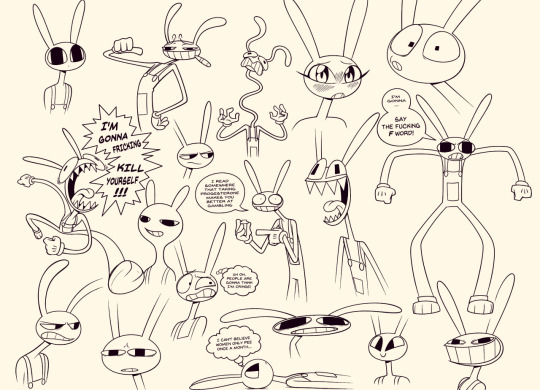
so gooseworx recently released more drawings of jax…
but looking closer you will notice something
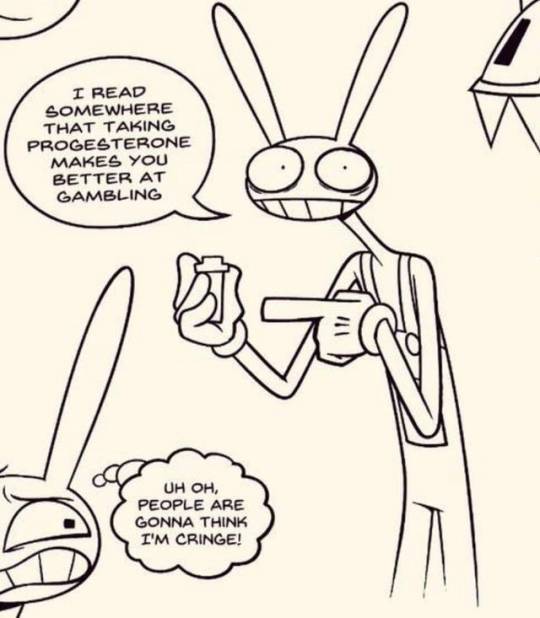
progesterone? you mean
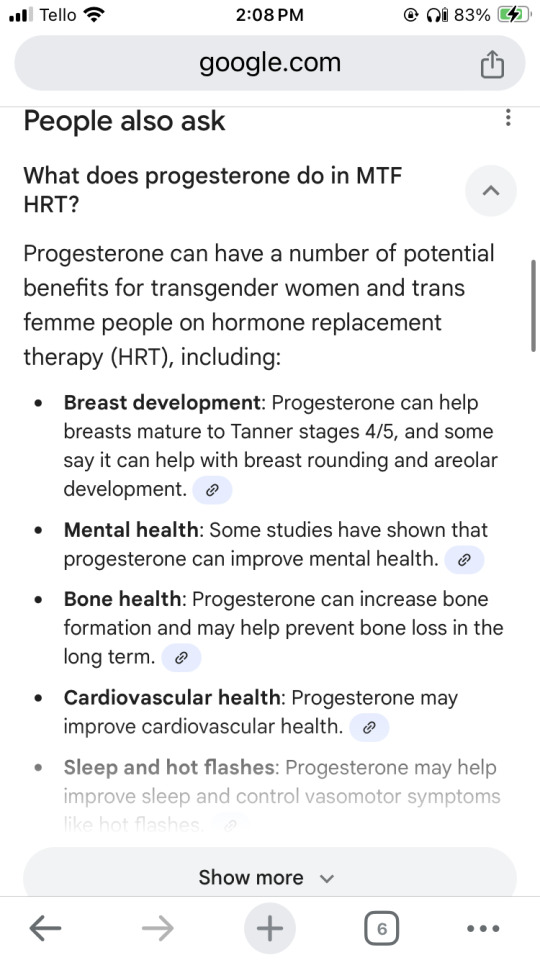
this progesterone???
is jax trying to mask her desire for tits by saying they help with gambling purposes???
but the plot thickens

these “issues” may be jealousy. jax wants to be a girl, and she takes out her frustrations on the other girls.
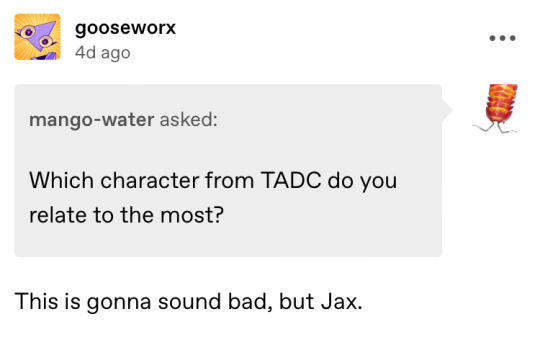
goosworx, a trans woman, relates most to jax. possibly because they’re both transgenders????????
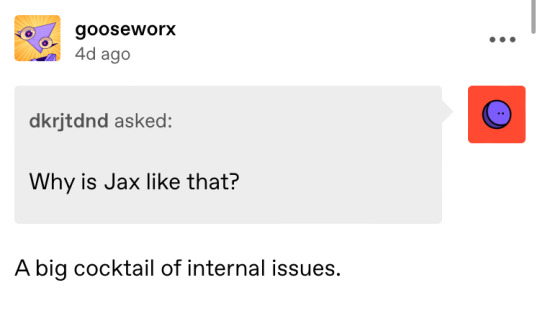
internal issues? gender dysphoria.
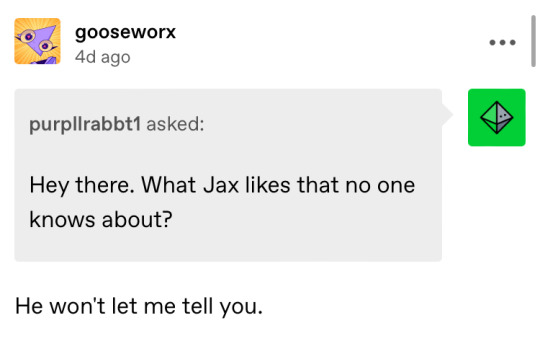
now, you know how gooseworx posted that drawing of jax in a maid dress? i’m gonna go on to say that this secret thing she likes but doesn’t want to share is that she actually loves wearing maid dresses.
anddd that’s not even mentioning the fact that jax was originally designed as a girl! only now gooseworx has opted for the Girl With Extra Steps path.
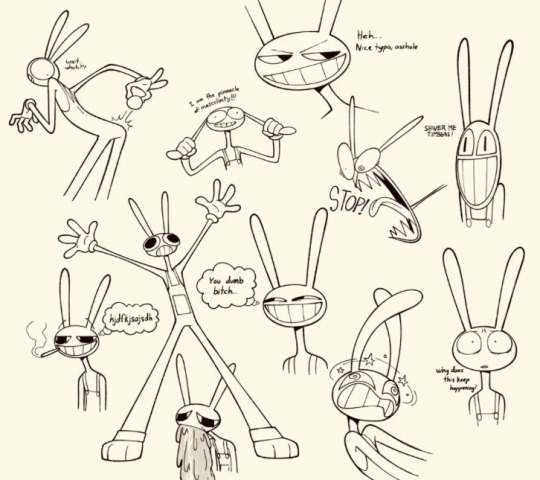
and if you look at some of the earlier jax sketches you can see that jax may be masking some insecurity revolving around her masculinity. as she says, and i quote “I am the pinnacle of masculinity!!!” maybe this is just her way of coping with the fact that she is NOT the pinnacle of masculinity and is in fact the pinnacle of femininity!!!
EDIT: adding on something

what if jax isn’t thinking of tits here in the typical straight man way? what if jax is thinking about HAVING tits here????
tl;dr jax is transfem and this is 1000% canon okay bye.
#crack theory#semi shitpost#jax tadc#jax#the amazing digital circus#tadc jax#tadc#tadc theory#tadc analysis#character analysis#mtf#transgender#the digital circus#digital circus#gooseworx#character theory
392 notes
·
View notes
Text
Pluto and “The Black Cat”
I guess it takes a community event for me to actually write out that Pluto post I've been planning for *checks notes* 2 months.
So, let's talk about Pluto (finally)!
By the way, spoilers, so if you're not into that:
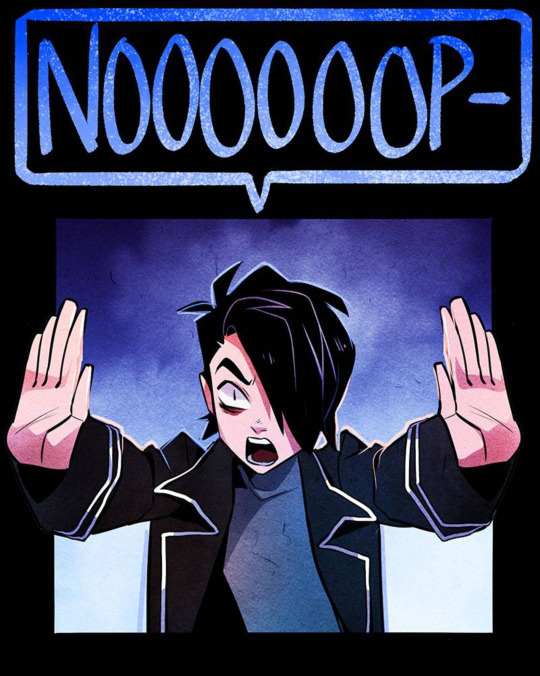
We're first introduced to Pluto during the Maze arc, where he's unceremoniously dumped on Duke and Lenore by the Posh Crew, which also includes his roommate Prospero.
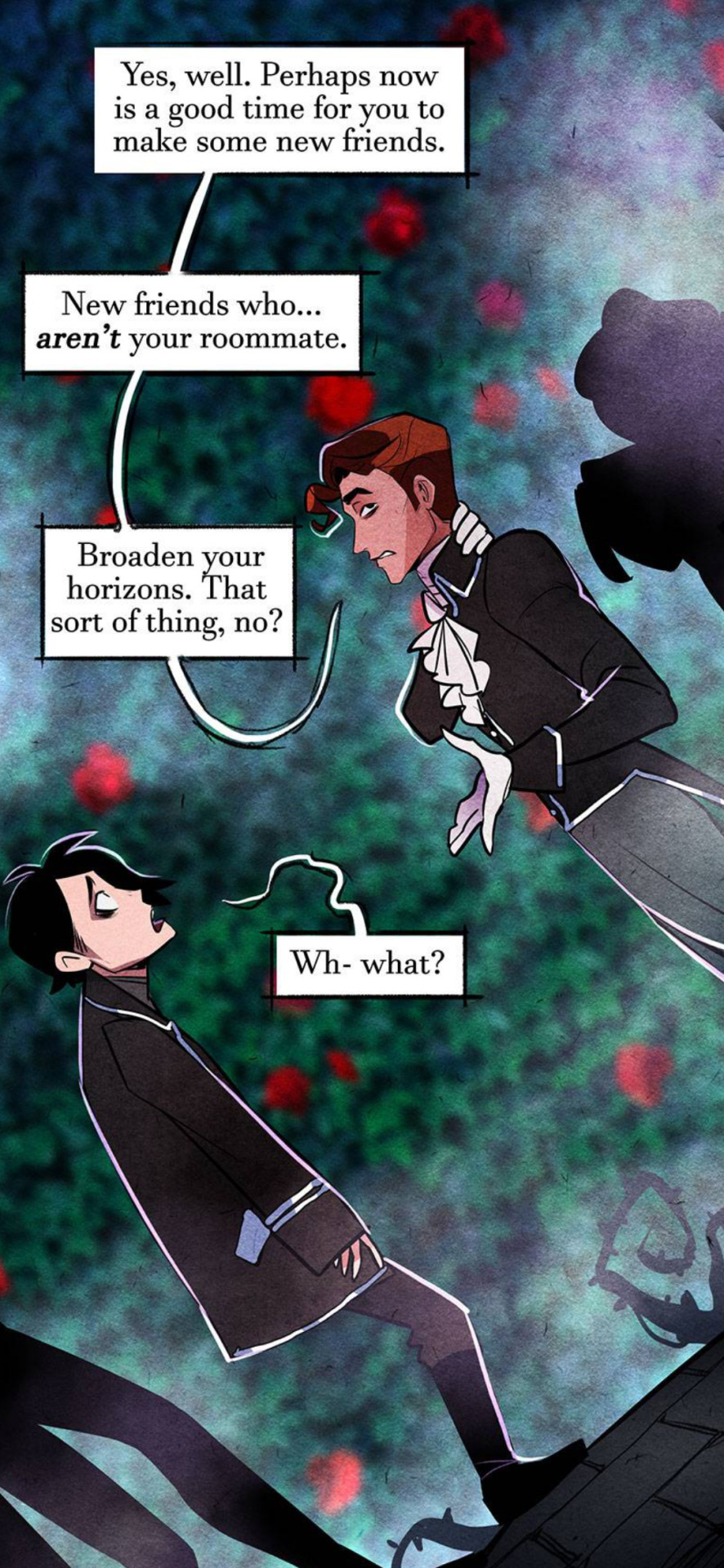
At first, it's easy to write Pluto off as kind of an emo soft boi. And in fact, Duke even tries to ditch him during the Acrophobia Trial.

It's not hard to see why. Aesthetically, Pluto has a much darker presentation than the rest of the cast which gives him the impression of a gloomy introvert that won't really contribute anything to the team. He wears a grey turtleneck instead of a white dress shirt marks him as a visual outcast; his slouching posture projects a lack of confidence; and his eye covering bangs actually do a lot of work to make him appear less communicative (windows to the soul, right?).
On top of that, Pluto's pretty small, a trait emphasized by his overly large jacket, which unlike other students, doesn't seem to be tailored to him, and his prickly personality don't earn him any teamwork points. I mean, just look at him:
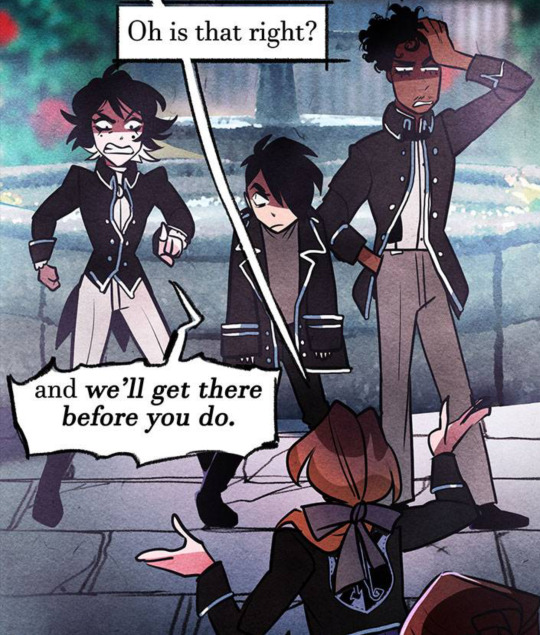
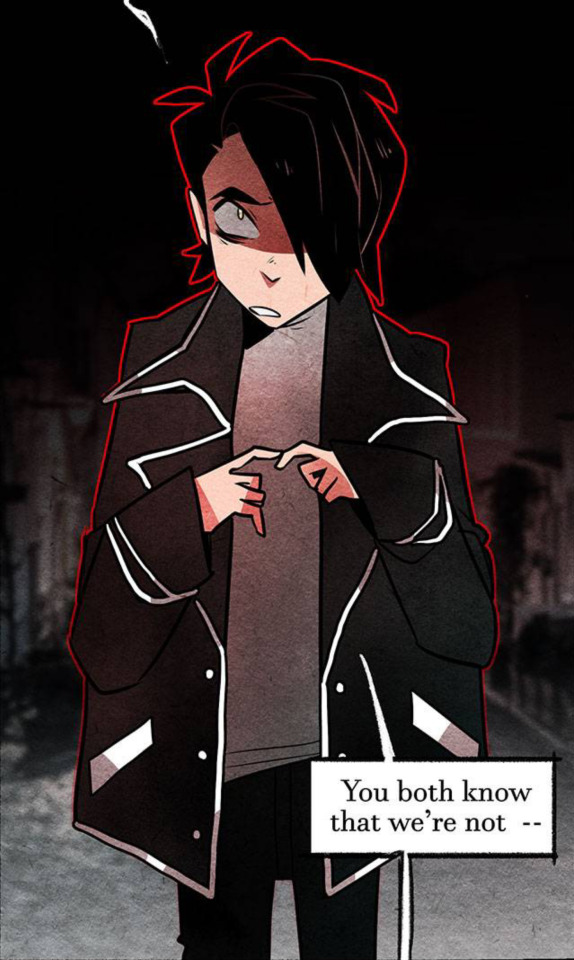
The point being, Pluto isn't exactly the image of confidence that Duke and Lenore need to help muscle through the maze.
That being said, like most great characters, Pluto almost immediately shows he has a lot more going for him than first impressions.
One thing that readers might have noticed is that because Pluto is pretty small and unassuming, he's great at sneaking around.
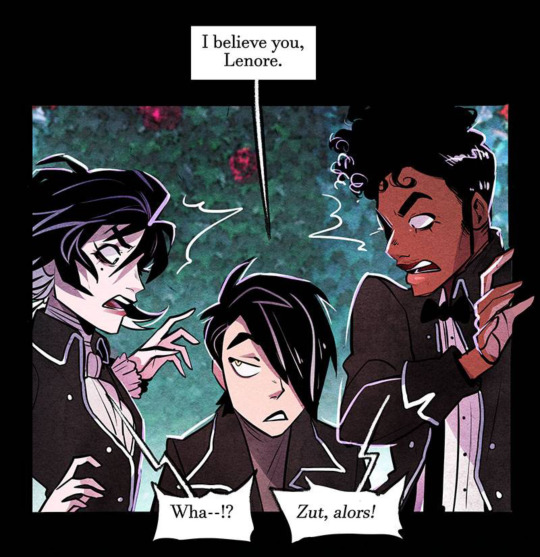
But since it's mostly played as a gag many people might have also missed this detail right after:
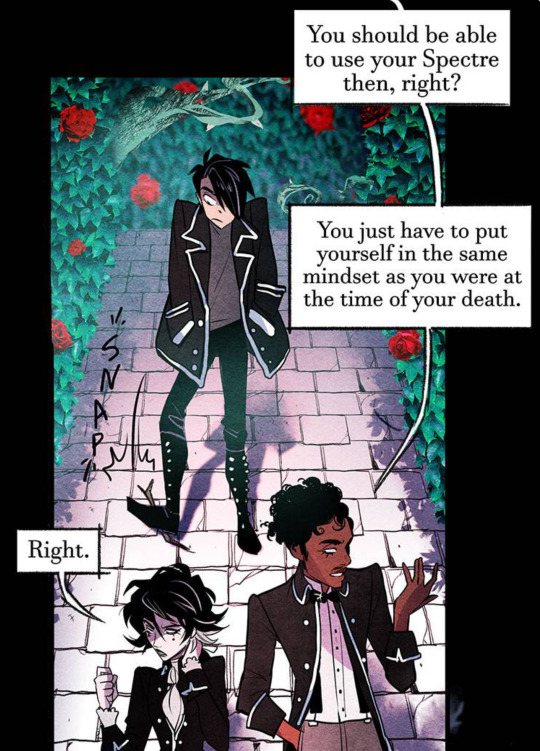
Pluto stepping on a branch isn't mindbogglingly important, but it does speak to his character in a really touching way. He immediately recognizes that his silence upsets Duke and Lenore and goes out of his way to make noise so they aren't startled by him, even though they really haven't been the nicest to him.
It's a small detail, but it shows that right from the beginning, Pluto is someone who cares about other people, which is further reinforced when he tries to break up Duke and Lenore during Duke's inconceived attempt to awaken Lenore's spectre:
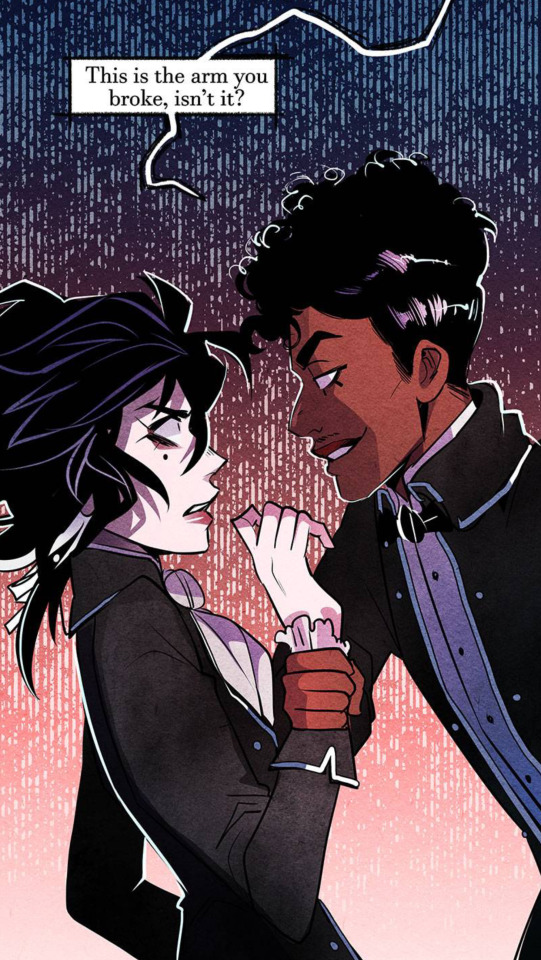
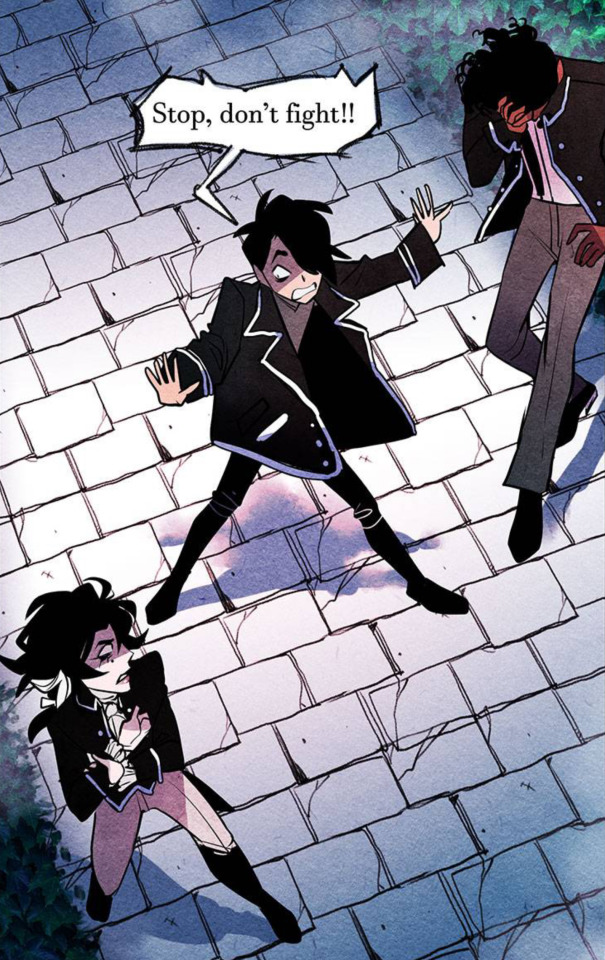
The maze also highlights a few of Pluto's other positive traits. For example, he's surprisingly interested in etymology (what a dork; I love him), which gives Red an easy way to explain the Greek/Latin roots to the readers while also playing up Pluto's allusion to the Roman god. It also indicates that Pluto is fairly book smart, which is directly contrasted by Duke's street smarts in the Chronophobia trial and Lenore's... instinct? Let's call it intuition.
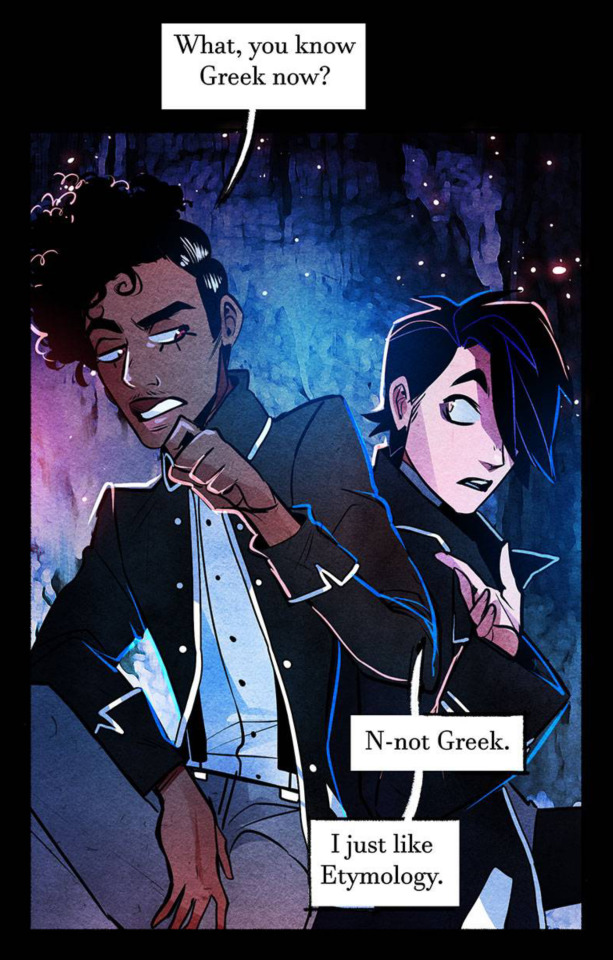
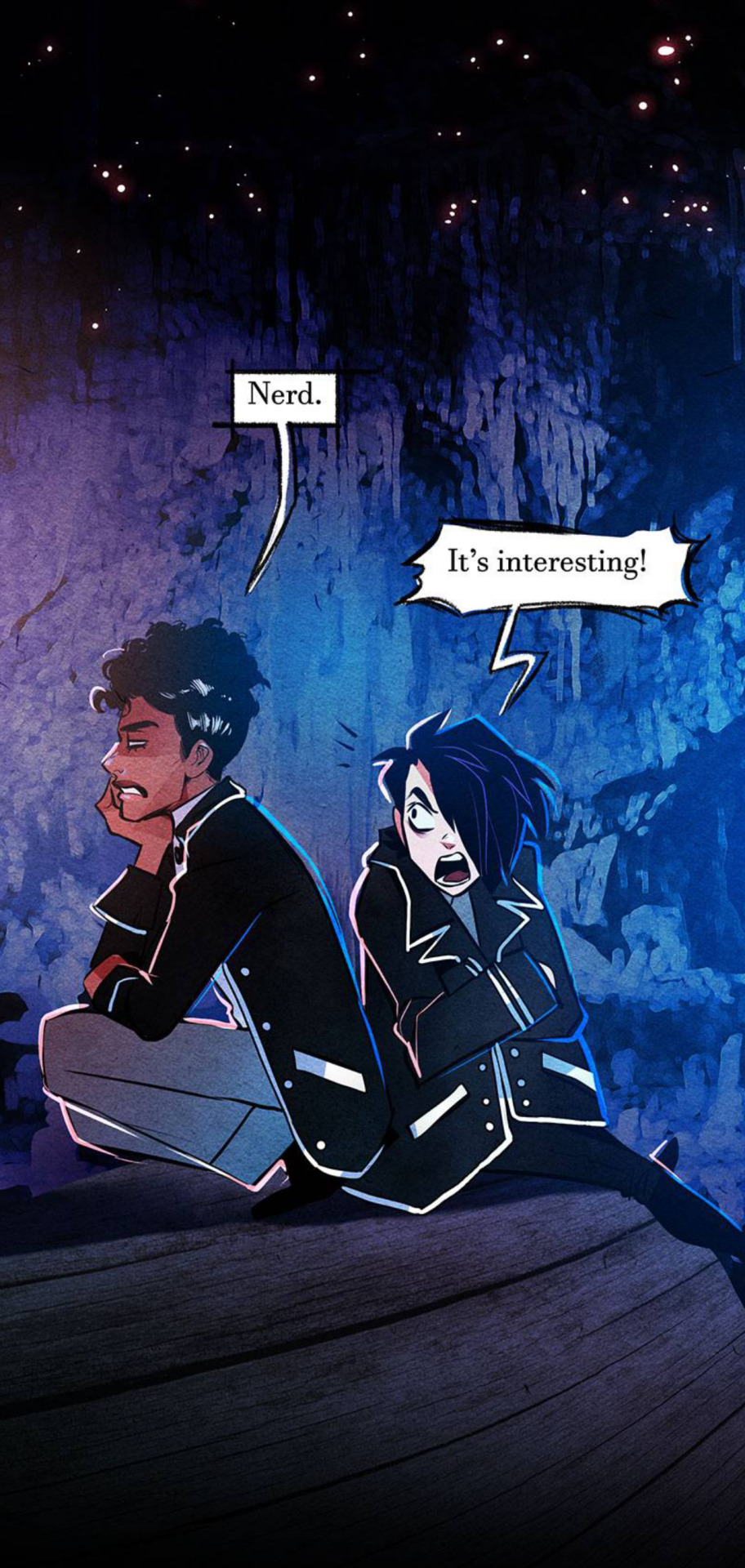
We also get a bit of foreshadowing for Pluto's spectre. One, he's actually pretty dextrous on a tightrope, and two, he can't swim, both of which are traits stereotypically associated with cats.
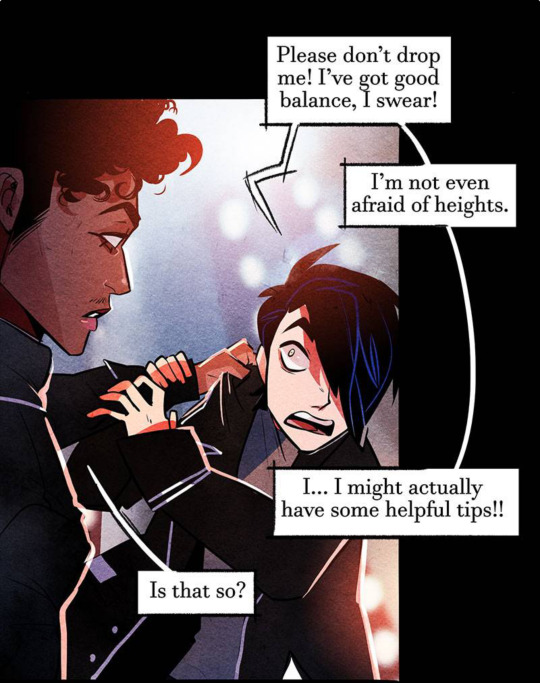
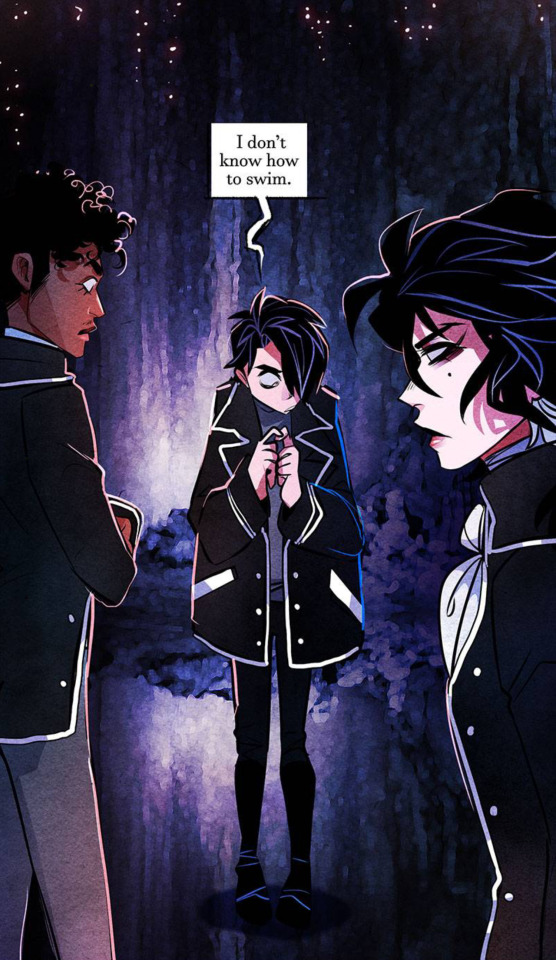
Speaking of which, Pluto's spectre:
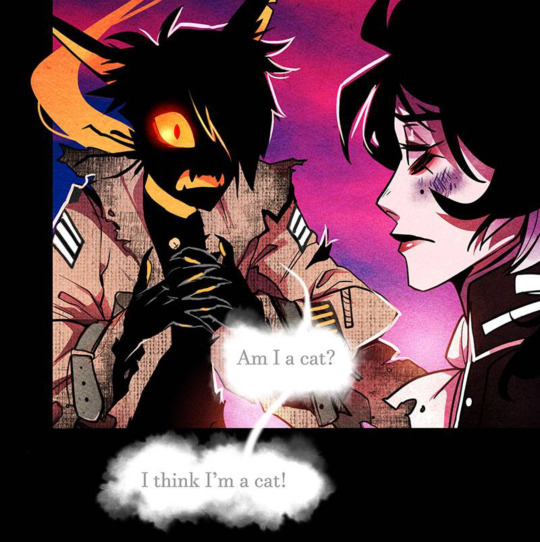
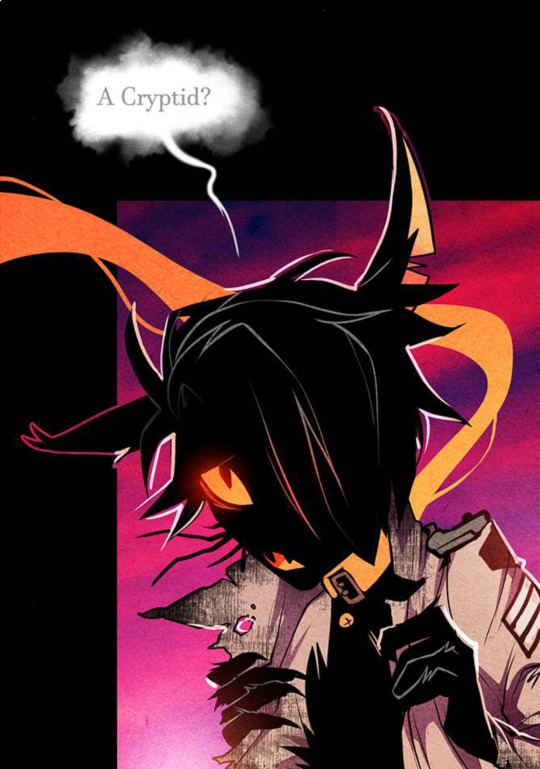
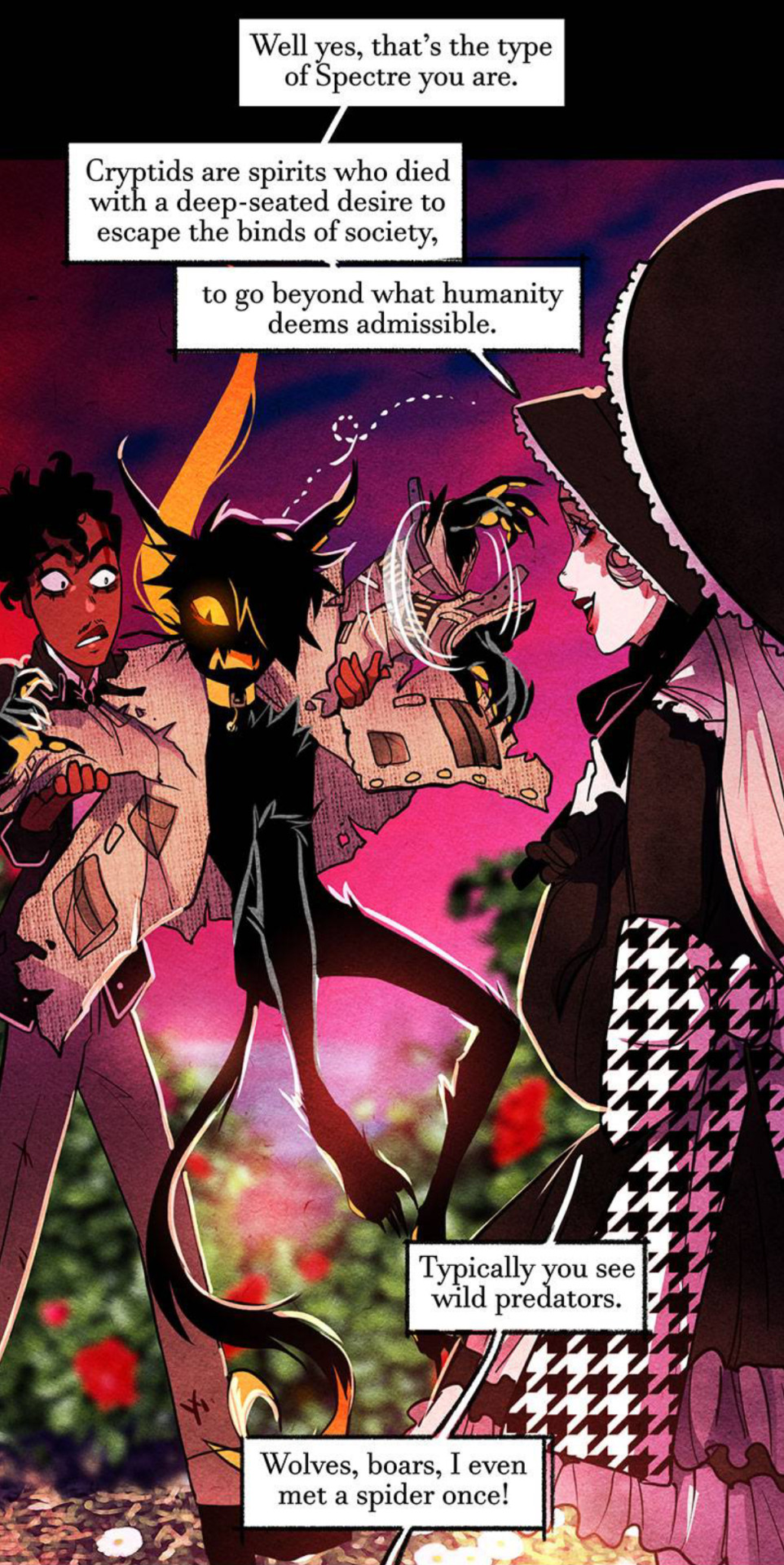

According to Poppet, Pluto is a Crytid, a type of Spectre that manifests when someone had a deep-seated desire to escape social constraints, but somewhat paradoxically, Pluto is a cat, a domesticated creature.
I'm going to take a small aside to say that cats really aren't that domesticated. I mean yes, who doesn't love tea cup kittens, but cats can return to the wild and they still share most of their genetic code and evolutionary instincts with their untamed counterparts, which can't really be said about dogs.
Okay, back to Nevermore, except I lied, we're actually going back to 1845 when Edgar Allan Poe published "The Black Cat".
If you didn't know (but you probably did. After all, you're reading a Nevermore character analysis), almost every Nevermore character is based on one or more works by EAP. (You can check out their main inspirations in this other post.)
And Pluto's story is "The Black Cat". It isn't one of Poe's most famous works, so you could be forgiven for not knowing about it, but if you have read it, you probably immediately recognized its influence on Pluto.
First, a brief overview of the story: (CW: animal abuse)
Like most Poe short stories, "The Black Cat" is narrated by an insane murderer (that's a tad hyperbolic, but you get the point). Unlike other narrators though, this narrator actually started out somewhat decent.
You see, the narrator used to be a loving husband to a woman that he married early in life. Both of them loved animals, so over the years, they cared for a lot of pets together, including "birds, gold-fish, a fine dog, rabbits, a small monkey, and a cat."
This cat is, of course, the titular Black Cat and his name is Pluto. He's also described as being the narrator's "favorite pet and playmate."

Unfortunately, the narrator is also an alcoholic, and his addiction gradually turns him from a loving and sensitive man into a violent mess. He's able to stave off his alcohol fueled abuse from Pluto for several years, but eventually, Pluto ticks him off and he grabs the cat and purposefully cuts out one of its eyes with a penknife.
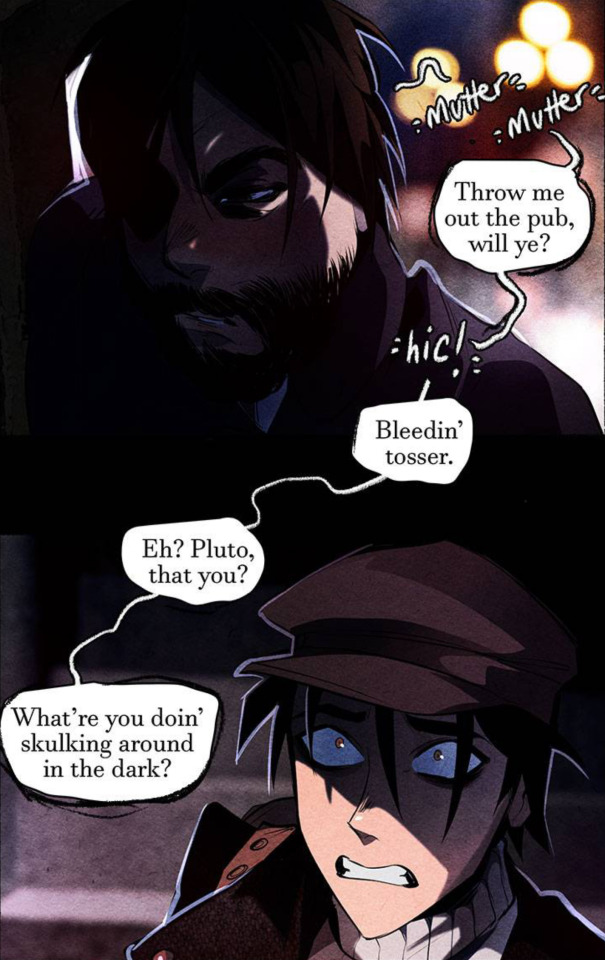
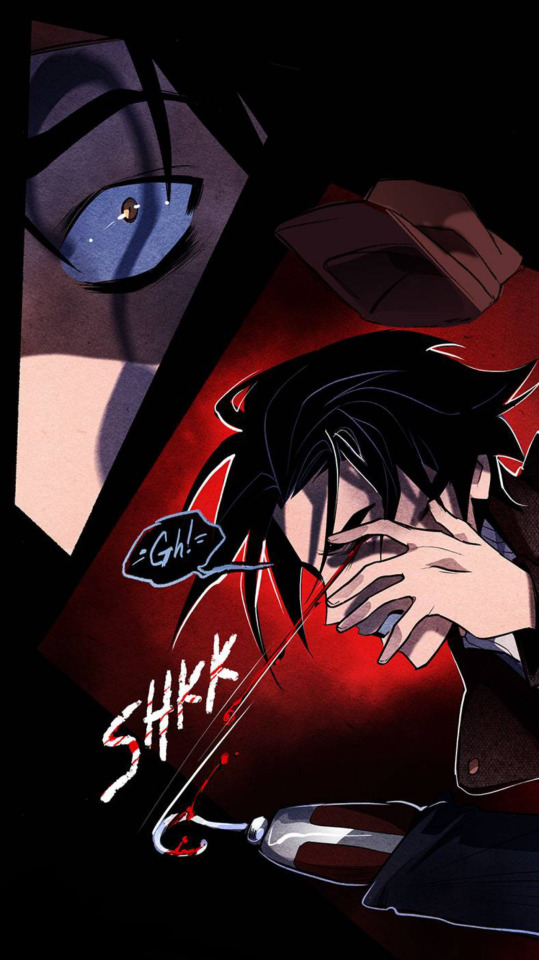
Understandably, Pluto (the cat) does not take kindly to this, and for the rest of its life tries to avoid the narrator, which the narrator takes surprisingly well.
At first.
Eventually, his alcoholism catches up with him and he decides that, for literally "no other reason than because he knows he should not" decides to hang the cat.
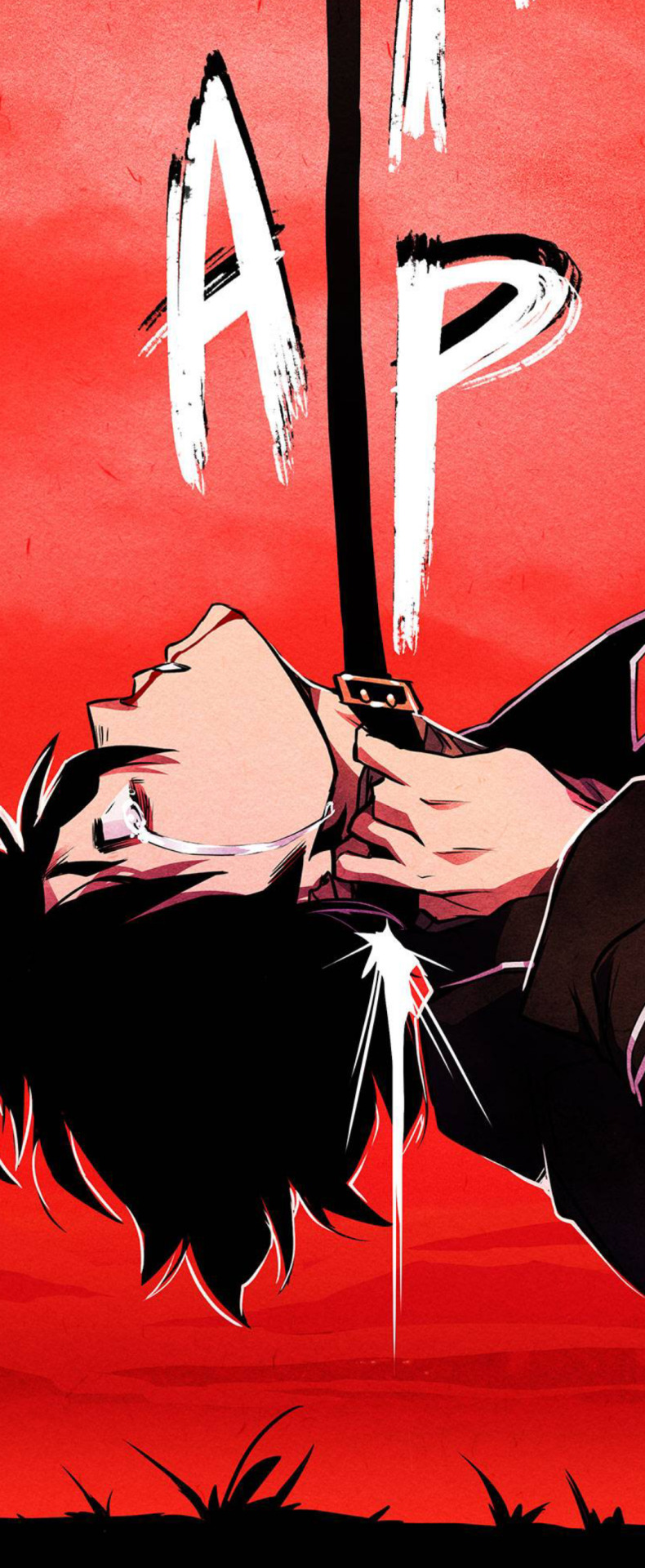
So, there are a ton of references to the short story in Nevermore. Pluto's dad is a physically abusive drunk who cuts out Pluto's eye, Pluto's name and spectre are inspired by the Black Cat, and the way Pluto unlocks his spectre mirrors how the narrator hangs his pet.
But there are arguably lot more allusions from the rest of the story. You see right after the narrator kills Pluto, his house burns down and there are two characters in Nevermore who are associated with fire:

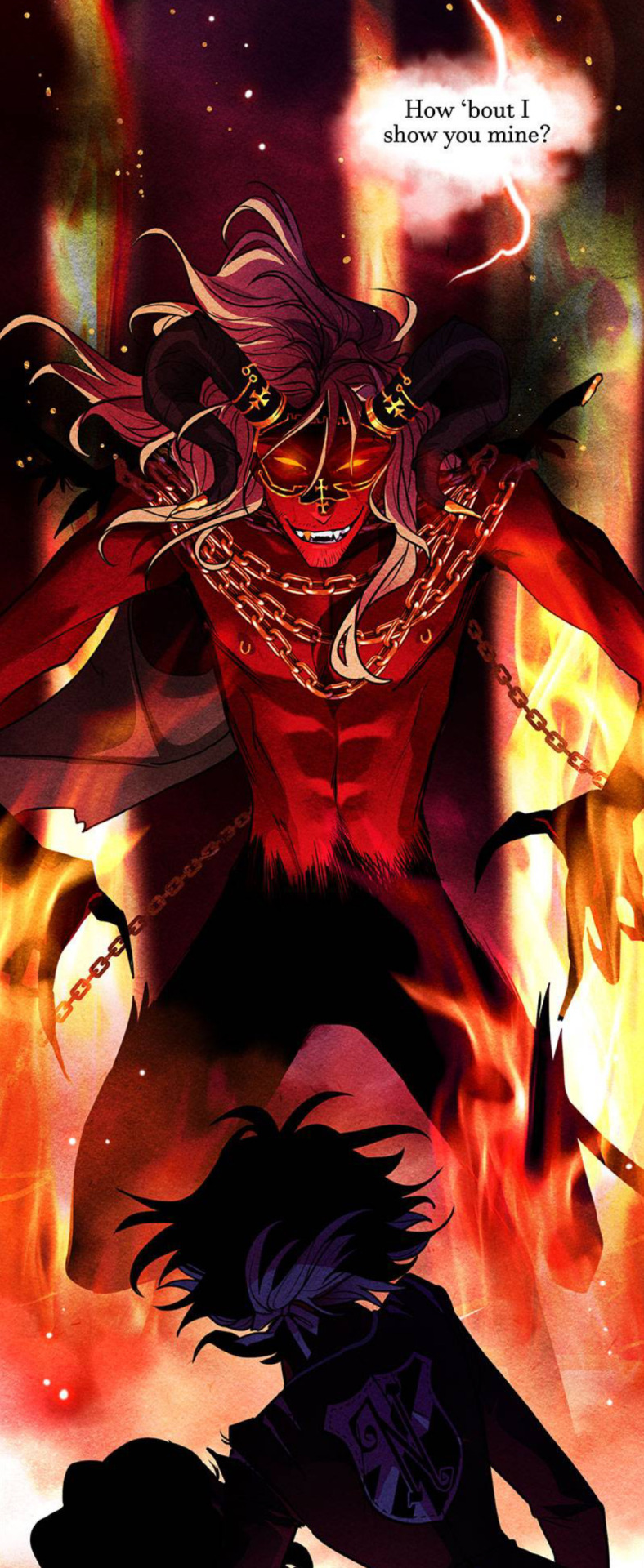
Lenore and Monty, both of whom have a pretty interesting relationship with Pluto, especially when you line them up with Pluto's short story.
If you associate the narrator's house burning down as karmic retribution, then Lenore is a natural pick. After all, she not only burns down her estate, her presence in Pluto's (after)life is arguably what causes him to start standing up for himself more, and at the very least, her leadership is what gets him through maze for a shot at the second life which dovetails nicely with the fallout of the narrator's house burning.
You see, the narrator doesn't perish along with his material possessions, but one wall of his house also survives, and burned into that wall is the image of a hanging cat, a reminder of his sins.
Soon after, the narrator, still drowning his sorrows and guilt at bars, happens upon a second cat who is "fully as large as Pluto, and closely resembling him in every aspect but one." It's even missing an eye. The only thing that separates it from Pluto is a patch of white hair on its chest.
Now the concept of doubling is one of Poe's hallmarks, and it's mirrored wonderfully in Nevermore by the students' past lives and their current unlife as students, or alternatively, their human form and their spectre form, but it's also symbolically present for Pluto because by leading him out of the maze, Lenore also leads Pluto on the path to a second life in addition to inspiring him to be more confident, which is arguably the difference between his past and current self.
Based on Pluto's memories, it doesn't seem like his father thought of him as a "man" and given his character introduction, Pluto was a meek person. But after meeting Lenore and befriending Duke, Pluto does this:
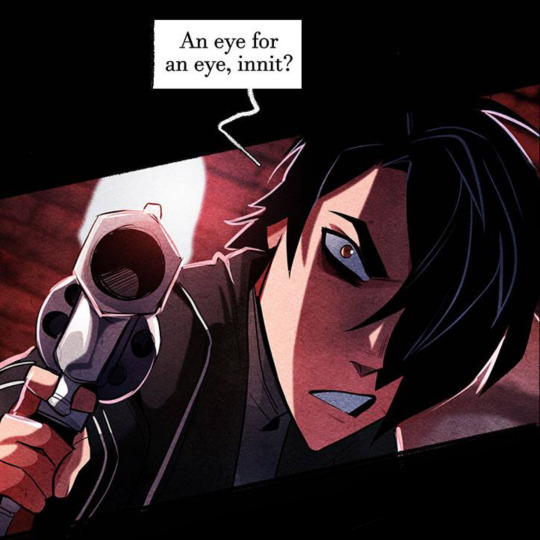
One, it's hilarious that Pluto is talking about taking eyes, but two, Pluto is fully ready to kill Monty here and that leads me to part two of the fire.
Monty is a self destructive individual. He purposefully instigates fights, loves to stir up trouble for no reason, and suffers from trauma that arguably isn't his fault (not to say that dealing with that trauma isn't his responsibility).
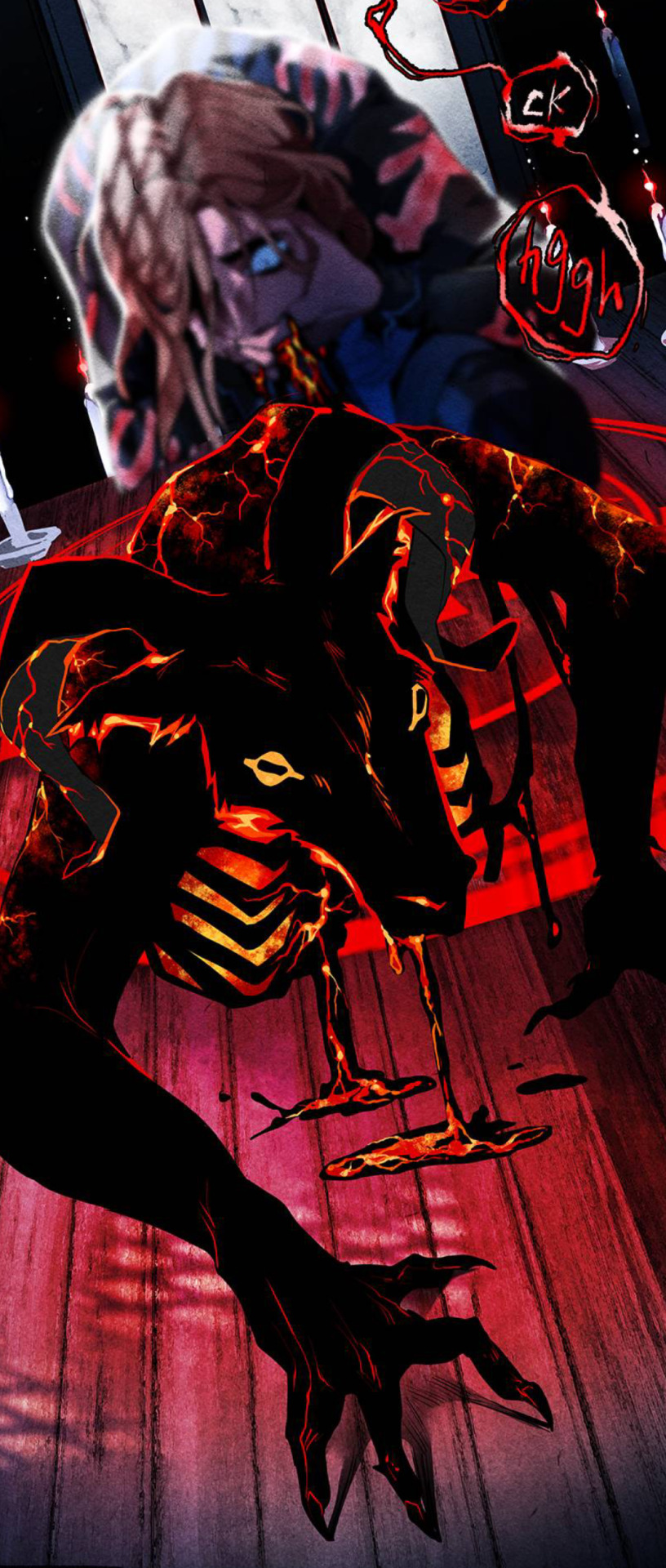
In some ways, he's haunted by his religious upbringing as much as the narrator of "The Black Cat" is by his alcoholism. Both are aware of how much it ruins their lives, but they can't help leaning into those violent tendencies. The narrator even calls his alcoholism a "fiend".
And, they both wall up someone they're rooming with.
Because, there's even more to the new black cat than driving the narrator insane. In fact, the narrator goes as far as murdering his wife while attempting to kill the new Pluto (I can't believe she stuck around, the poor woman).
And like any Poe narrator worth his salt, "The Black Cat" narrator decides to hide the body by walling her up in a false chimney. This comes with the added benefit of scaring the new black cat away so the narrator can finally enjoy some piece and quiet.
Only it turns out this is a lie. Just like Monty narrowly avoiding Pluto's gunshot, the Black Cat's absence turns out to be the narrator's undoing because the narrator accidently walled up the cat with his wife's corpse, and it's the cat's screeching that ultimately unmasks his crimes.
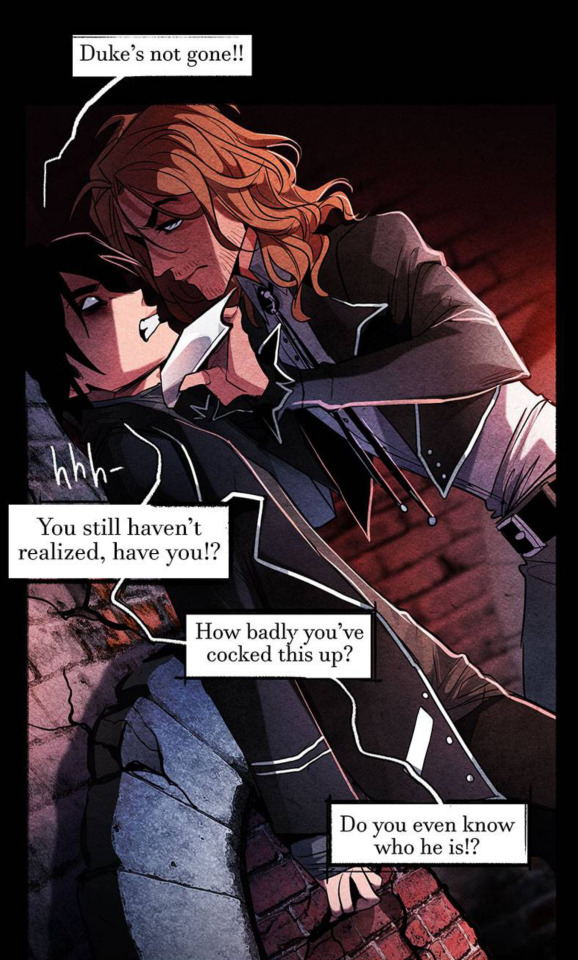
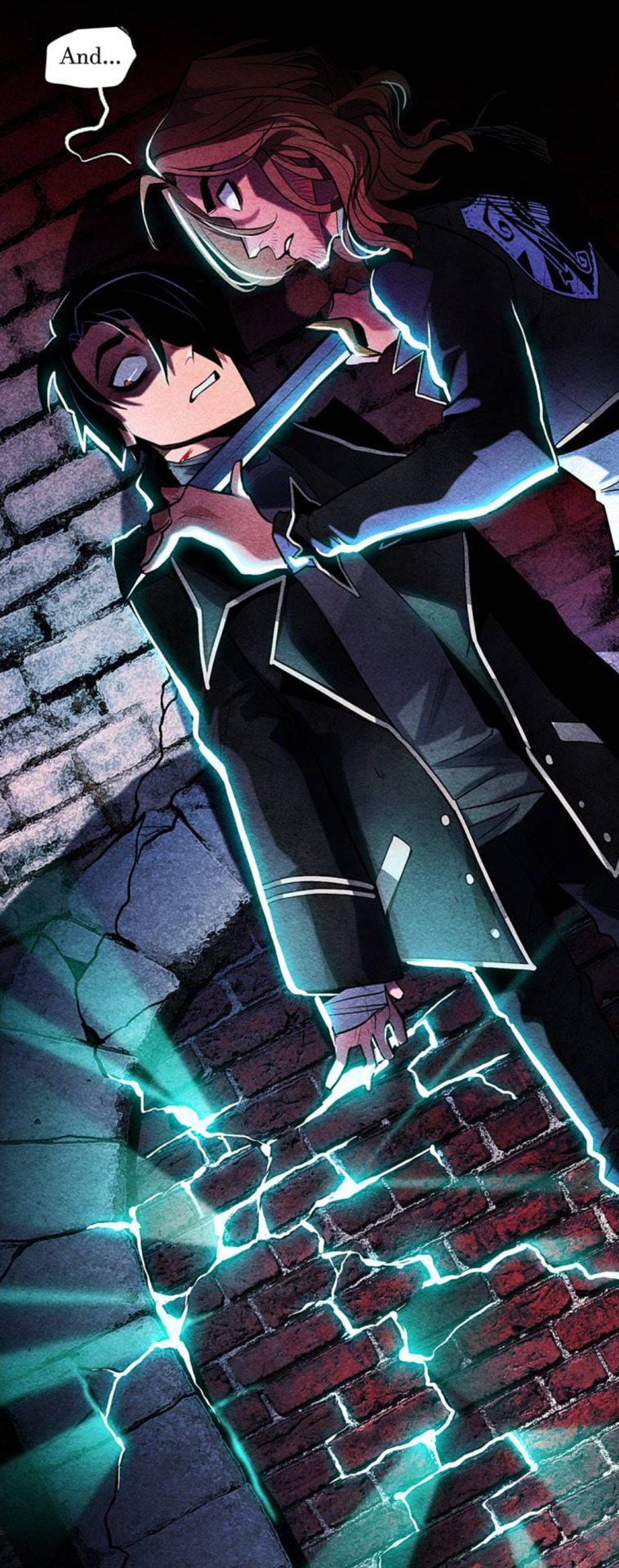
Similarly, it's Pluto's belief in Duke that activates Duke's spectre, "freeing a corpse" and leading to the much needed string of chapters where everyone dunks on Monty. (Thank you, Pluto.)
I think it's really neat that Red managed to blend multiple Poe stories into a new plot thread, and I'm really looking forward to seeing what she and Flynn have in store with Pluto because even though his inspiration story has been pretty much fully acted out, most of spectre abilities really haven't been explored.
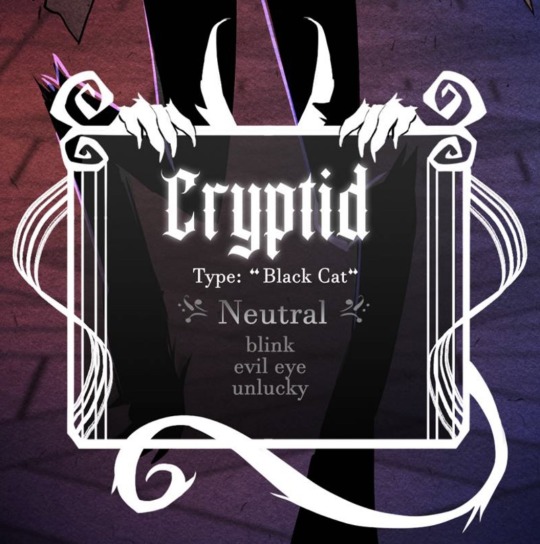
For instance, while "unlucky" is a general description of black cats, Pluto's presence has actually been a major boon for the misfits, saving Duke, explaining the thalassophobia trial in the maze, guiding Lenore and Duke through Acrophobia, and also warning Lenore and defending her during the Manor arc. Maybe it's bad luck for his enemies or straight up luck manipulation?
"Blink" could be a reference to Pluto's dash attack, but Pluto also has an uncanny ability to disappear from people's perception as demonstrated during the maze and to a lesser extent when he hides from Eulalie in the forbidden wing.
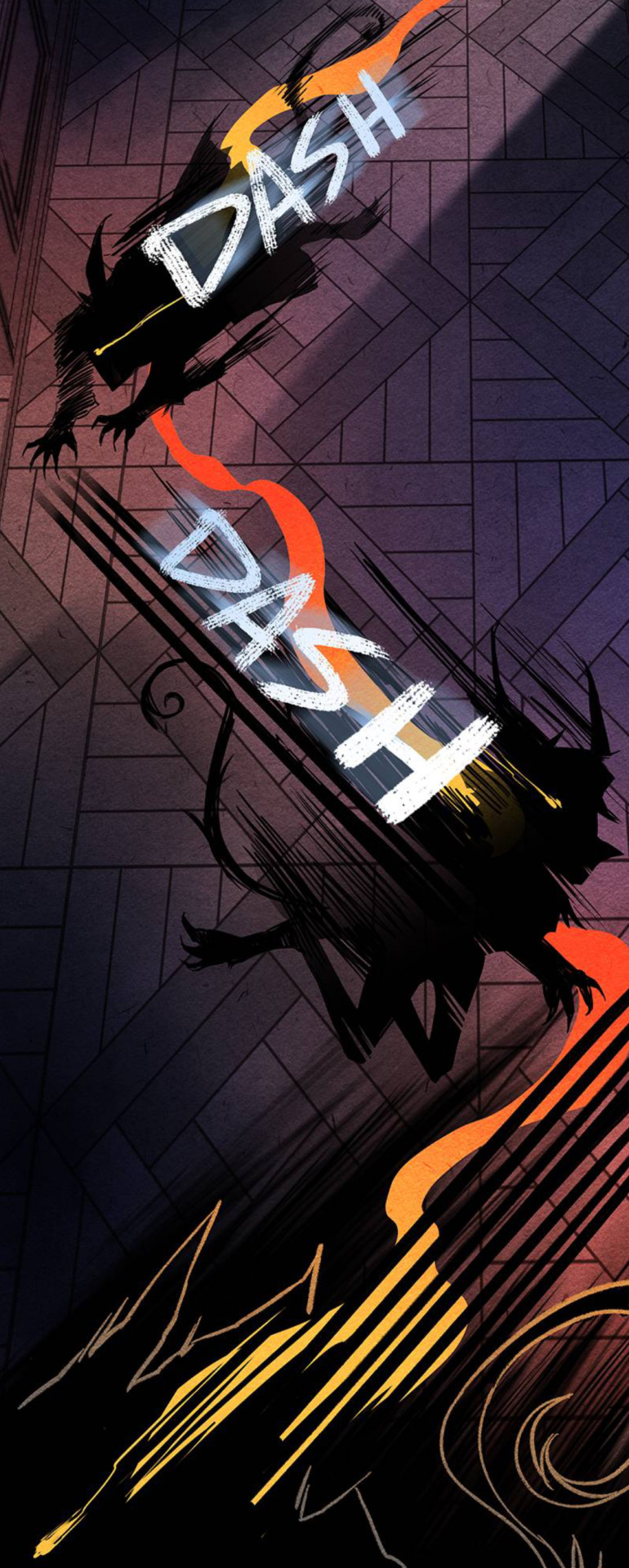
For those of us into TTRPGs, blink is also sometimes used to refer to teleporting or the DnD spell of the same name with causes the caster to fade in and out of existence!
And finally, "evil eye" is a very intriguing ability. While it could just be a reference to Pluto's missing/remaining eye, as @takescrackseriously and other readers have pointed out, it could also be a reference to Poe's "Telltale Heart" maybe having the ability to drive victims mad, like Pluto's namesake (er, reincarnation?) does in "The Black Cat".
That brings up another question, which is why is Pluto still missing his eye? Lenore was also seriously injured in life, but she isn't crippled like she was post-Theo as a student. What injuries get to be healed and which remain in Nevermore?
I'm interested to see if, like Will's freaky blood wax clones, spectres' powers can develop and how far they can develop. After all, Pluto's power set seems fairly basic, and while I love underdogs (undercats?), ostensibly there's some kind of balancing system that makes traits like "blink" and "teeth" keep up with monsters like "fear itself" and "divine light".
Okay, maybe not given the ruthless nature of the academy and the Raven's comments, but narratively that can feel a bit unsatisfying, y'know? Because it would be such a waste for Pluto's development to stall here despite the amazing amount of progress he's already made.
Plus, aesthetically, I'm willing to bet Flynn is going to incorporate more white into Pluto's character design, because a considerable amount of detail focuses on this one difference between Pluto and the new cat in the short story. In fact, it seems to be one of the factors in the narrator's full descent into madness because he starts seeing the cat's white patch as morphing into the image of a noose.
And to close out this really lengthy post on a bright note, have some terrified Pluto:
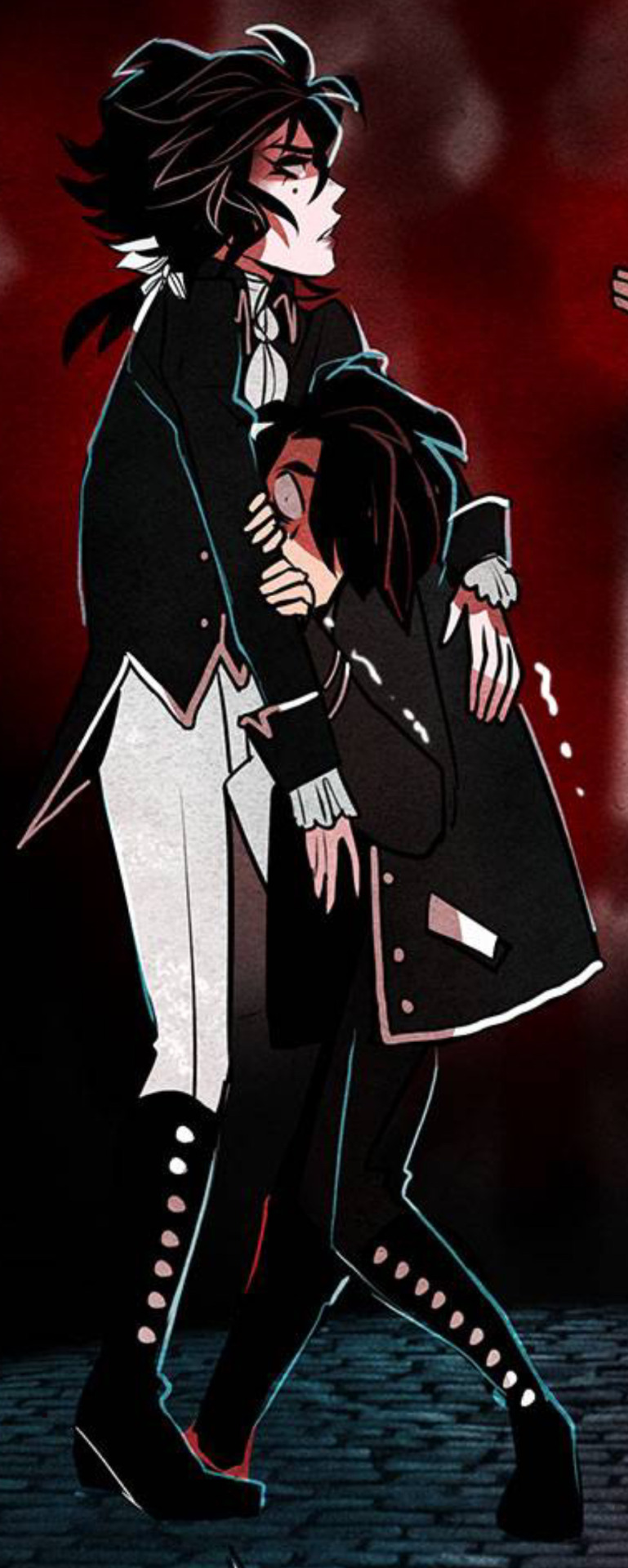
What a cutie. We must protect him at all costs.
By the way, if you enjoyed my rambling, here are links to similar theory/analysis posts talking about Ada and Annabel!
#nevermore webtoon#nevermore webcomic#pluto nevermore#character analysis#character theory#theory#nevermore theory#lenore nevermore#montresor nevermore#edgar allan poe#Black cat#short story#parallels#spectre talk#by the way#if you're here#check out my other character posts#I've already got ones on Ada and Annabel!#duke nevermore#almost forgot about you bro#don't worry#Pluto would never#catboy#emo boy#soft boy#I love him
136 notes
·
View notes
Text
So I rewatched the House episode about the autistic child wherein Wilson correctly diagnoses House as being on the spectrum and then seemingly goes back on it for no valid reason. The most likely reason for this is writer cowardice (they didn't want to have to deal with a canon autistic character), but allow me to present a conspiracy theory: Wilson is autistic.
He has only one friend, who is also on the spectrum, because that friend alone can see and appreciate the side of him he usually hides. He has the same random interests as this friend. He seems to be the only one to understand what his friend is trying to say. He gives House second chance after second chance because he knows what it is like to miscommunicate/tries to give benefit of the doubt.
Most of his social interactions are extremely surface level: he has a pleasant script he sticks to, either for flirting, talking to a patient, or just talking to any random nt person. He gets married to people he doesn't let past the mask both because he wants to conform to social standards. He does it again because he thinks he just messed up the script last time and this time he will get it right. He cheats because he doesn't instinctively link sex and intimacy--what he grasps as a standard mistake is actually a betrayal. This also might explain why his most intimate relationship is with House, the person he doesn't script around, even though they never have canon sex.
He wants to be needed because when he can help people he feels like he is doing socializing right. When someone no longer needs him, he panics, because he either has to stop scripting or increase scripting, and both scare him.
He is also extremely specific about his routines and preferences, and gets annoyed when they are disrupted. He is paralyzed by open-ended decisions: when he is turned loose in a furniture store, he can't make a single choice because there are so many.
Wilson is extremely invested in scripting, to the point where he flees relationships when it no longer works. He spends all day every day trying very hard to be the picture perfect doctor, spouse, friend, etc. So when House is dealing with sensory issues around the carpet, he helps by explaining to Cuddy something he alone of the other characters understands. But when he talks to House about it, he blows this understanding off. In his mind, he works so hard to be so nice, so therefore it is possible, even if damages him. He probably doesn't know it damages him to the extent it does. Therefore, he insists House's behavior isn't because he's autistic, but rather because he's just an ass. Because if autism is an excuse to not mask, he hasn't needed to mask this whole time.
Not saying I'm wholly invested in this theory, but *imitates House's voice* "it fits."
605 notes
·
View notes
Text
Homicipher Theory
Mr. Gap: The Homicidal Stalker
Disclaimer: This is all just my own interpretation and speculation. This is not negative or an attack on the character. I love Mr. Gap for being the worst of the worst. He’s sickening and awful and makes my skin crawl but in the best way that horror fiction can manage.
That said, Trigger Warnings: Mentions of stalking, sexual assault, serial killing, and cannibalism
Also
Homicipher spoilers/Mr Gap ending spoilers
-
If we go by my pre-established theory that the Ghost Apartments are a haunted grounds where an apartment building was built over the ruins of a hospital and collapsed subway, then we must assume that it’s haunted by ghosts from many different time periods. I believe that ghosts like Mr. Crawling and Mr. Hood are among the oldest, original haunts. Ghosts like Mr. Silvair and the nurse are from the hospital time period. Some ghosts are from the subway collapse. And some, like Mr. Gap and the Bride, are more recent, from when the apartment building still had occupants before its abandonment.
Mr. Gap is a rather unique entity among the ghosts. He’s the only one who can be anywhere at any time, can easily shift between the real world and the spirit realm, and clearly understands that he is a ghost.
But why? What makes him special?
I fear that the answer may be an unsavory one...
Mr. Gap
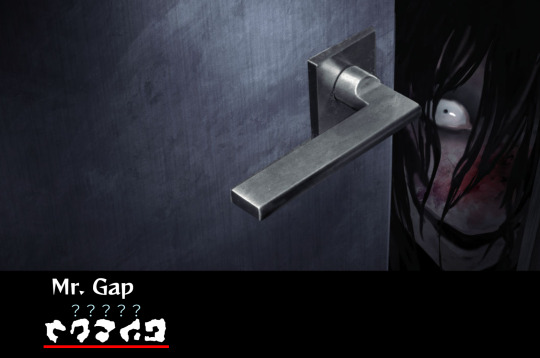
Mr. Gap is the second entity we can meet once we wake up with control of ourselves in the Ghost Apartments. Moments before we meet him, Mr. Hood gives us a warning. He tells us to be careful, there are dangerous entities out there.
Ignoring his advice entirely, we interact with Mr. Gap. And since we don’t know the language yet, we’re very likely to smile at him, resulting in our first swift death of the game via getting our heart ripped out and eaten.
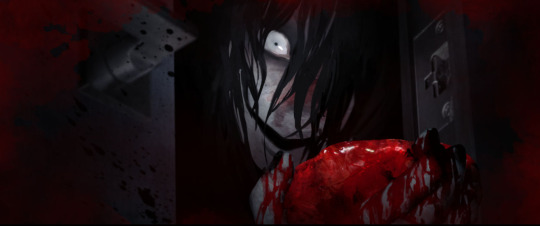
The best thing we can do in early game is to ignore him. When he asks for a body part, step away. Later on, we can interact with him more directly, but initially, survival means not flashing him our pearly whites.
It becomes obvious early on why he’s called Mr. Gap. It’s because he…well, he only exists in gaps. He’s not a roaming ghost, he appears to be bound by the walls of this ever-changing building. But wherever there’s a hole in the wall, there’s Mr. Gap, peering out from between strands of greasy hair with one eye.
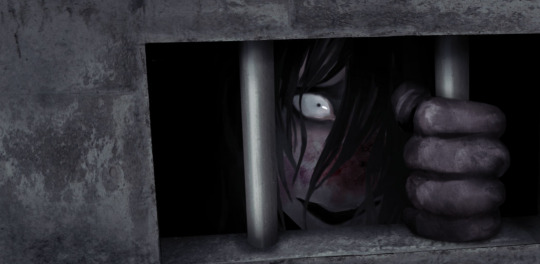
Every time we interact with him, he requests a body part from us. Heart, arm, leg, head…and he means this literally. If we consent (or even just smile at him) he’ll devour whatever body part he asked for.

But he can be helpful. While being chased by Mr. Hugeface, we can desperately ask him to get us out of there and force ourselves into a vent with him. He agrees to take us to safety, though not out of the kindness of his heart. He always wants something in return. Fortunately for us, he settles for just some of our hair this time.

There is never a time when he’s not trying to weasel something out of us. Even in his own endings, he bargains and pleads for our heart.
Now, you can easily interpret this to simply mean that he’s some sort of mischievous spirit. Evil in the eyes of humans, but more of a representation of chaotic neutral yokai. Certainly, some of the entities in the Ghost Apartments bear loose similarities to yokai. And the tropes of bargaining and trickery go hand in hand with these sorts of myths.
Personally, I lean away from that reading because the game actually doesn’t seem to use very much in the way of Japanese yokai myths. I dug deep trying to drawn comparisons for each of the ghosts, but they were loose at best. There seems much more evidence that the ghosts are, as the name implies, actual ghosts of humans who died here, rather than spiritual entities.
And if that’s the case, it begs the question: Who was Mr. Gap? How did he die? Why does he haunt rather than move on into the afterlife?
I feel that the imagery of his character makes the answers obvious. The game takes place in an apartment building where Mr. Gap lives in the walls. I think that’s a direct reference to his life before death.
I theorize that when the apartment was inhabited, Mr. Gap was a man who crept through crawlspaces and inside of walls in order to spy on women. I believe it can be interpreted that he also lured, abused, and killed those women.
“Mighty hefty accusations, Wren. Where’s your proof?”
No proof, only evidence from my own interpretation to support the claims! I'm sure there are plenty of other ways to interpret his character, this is just mine!
Exhibit A - Living in the walls. Again, this seems the most obvious and on-the-nose point. He quite literally lives in the walls and is bound to spaces with gaps. But he also has an apparently innate ability to navigate the ghost apartments no matter how much it shift and changes. This could allude to how he had the internal structure of the apartment building perfectly mapped when he was alive.
More importantly, he only makes himself seen through holes in the walls and gaps like vents. And we know he’s watching us at all times from those very gaps. This is a direct reference to him being a peeping Tom. Even the other ghosts seem to recognize this, as we can get a humorous scene of Mr. Silvair taping up a hole in the wall so that Mr. Gap can’t look inside.
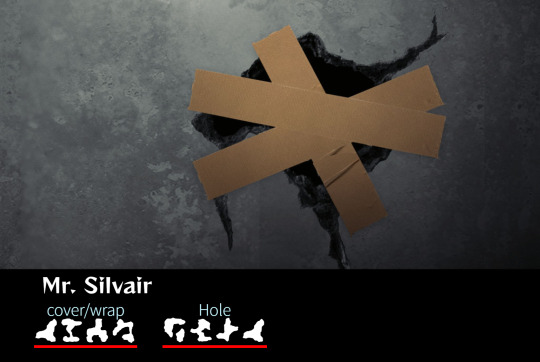
Exhibit B - Self Awareness. This is the most fascinating aspect of Mr. Gap, in my opinion. Most of the ghosts we meet seem fragmented or confused. If they know what they are, or were, they don’t show it. They seem to understand that there’s an “other” place, but not really the distinction between life and death.
Mr. Gap, however, outright knows and brags about being a ghost. At one point, he shows us old newspaper clippings with a photo of three women with censored faces standing in front of the apartment building, with Mr. Gap in a window behind them.

He can, and does, travel between realms. I assume this is possible because he’s bound to spaces within the apartment, but not specifically spaces in the spirit realm. The apartment is his cage, not the spirit realm itself. Because of this, he’s perfectly capable of peering out at modern day strangers walking by on the street and in the alleys. Also perfectly capable of haunting the old building and keeping its property value at a hearty zero.
But what does self awareness have to do with him being a criminal stalker and killer? Well, I think that he’s afforded these sort of rule-breaking abilities for one main reason, which brings me to…
Exhibit C - He’s a psychopath. No, I’m not using the term colloquially. I mean that truly, by definition, Mr. Gap is a psychopath. To be more accurate, by today’s definitions in the DSM-5, he would have Antisocial Personality Disorder (ASPD), characterized by a lack of empathy, disregard for others, and deceitfulness (*ASPD is more complex than this, please do not take this as a statement on the disorder which is characterized by much more than these three things).
If this seems like a stretch, I invite you to look at the three endings you can get at a particular point in the game, all involving Mr. Gap.
In this unfortunate decision path, we manage to escape the Ghost Apartments. However, by this points we’re too far gone to be able to live among normal society. Not only has our memory been warped by the ghost realm, but our body is unrecognizable and grotesquely inhuman. We know this based on the reaction of the first person we ask for directions. He panics at the sight of us and flees. We are, for all intents and purposes, the rotting Michael Afton parading about as a normal human while looking like a decaying zombie.

At this point there’s only one person left who can help us. Mr. Gap. Since he’s the only one who can cross between worlds. But even at our darkest and most vulnerable moment, is he going to help out of the kindness of his heart? No, of course not! In fact, he takes it as the perfect opportunity to ask for our heart again, the same way he did the very first time we spoke to him.
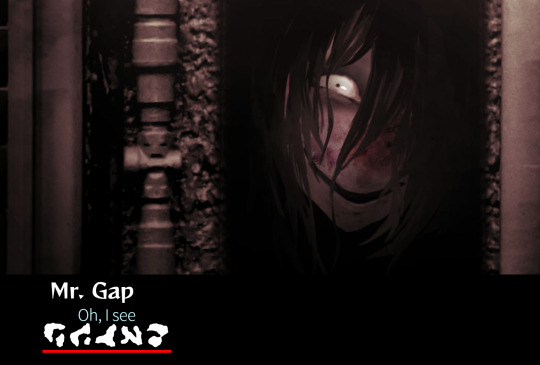
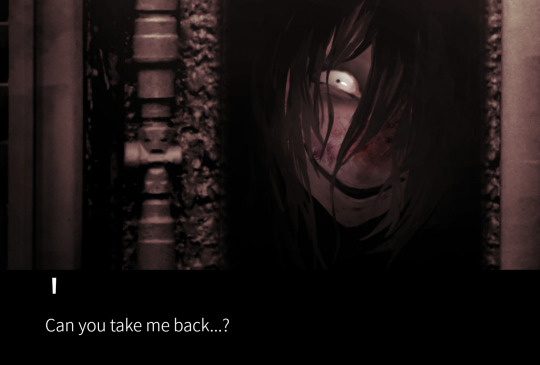

We have three options. 1, give him our heart. As expected, the ending is the same as the beginning. He kills us and eats our heart. 2, refuse to give him our heart. He’s disappointed, but leaves us alone. We wander down the alley but don’t get far before we pass out. And then…Mr. Gap takes our unconscious body and, wouldn’t you know it, eats us anyway.
In the third option, we give him someone else’s heart. We kill a random person and deliver their heart to Mr. Gap instead. He’s not exactly pleased but he did make a deal to bring us back, so he reluctantly drags us back into the apartment.
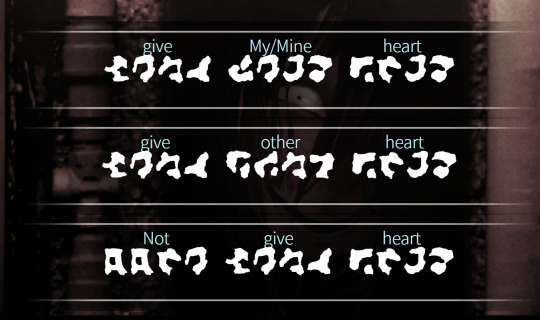
Sadly, while Mr. Gap is able to cross realms at will, he can’t bring us across. Instead, it seems he just brings us inside of the abandoned apartment. We don’t fully understand this though, which seems deceptive on his part. Sure, yes, he brought us back as promised. But not to where we wanted to be.
Now, it’s just us and Mr. Gap. Of course, he keeps begging for body parts. Except now, we have the chance to ask him why. The question…confuses him, even seems to irritate him. “Why?” What reason does there need to be besides that it’s fun?

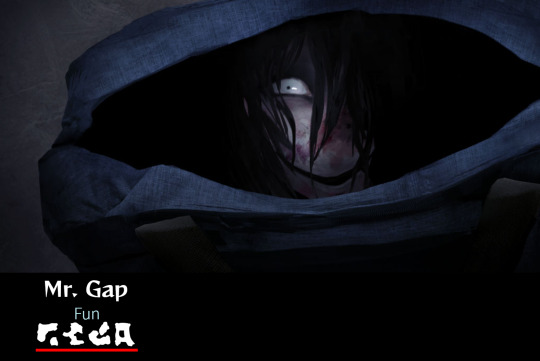
Honestly, this interaction was bone-chilling to me. By no stretch of the imagination does Mr. Gap view us as anything more than a shiny toy (that was how I felt about it here at least).
I believe it’s this callousness that acts as his superpower. Unlike the other ghosts, he doesn’t have any emotional attachments preventing him from moving on to the afterlife. There’s no particularly strong thing keeping him here. He’s not repenting (Mr. Hood), he’s not in a cycle of suffering (Ms. Blue-Clad/Mr. Chopped), he’s not obsessively invested in his life’s purpose (Mr. Silvair). He’s just. Having fun.
I think this is a carry-over from when he was alive. He had no particular reason for stalking and killing beyond the fact that it was fun for him.
Because of this, he’s not trapped in the same way as the other ghosts. He’s actually quite content to cross between realms and peep at women who wander by. And if he’s real lucky, someone will get close enough to snatch.
Exhibit D - The Newspaper Clippings. What’s so special about them apart from the clear fact that he’s bragging about being a ghost? Well…I don’t think that’s all that he was bragging about. This old clipping includes a picture of three women with censored faces standing in front of the apartment. Victims, perhaps? It’s quite common for serial killers to keep trophies or memorabilia of their kills. Taking newspaper clippings reporting on the crime is actually a big one.

Exhibit E - Cannibalism. Now this, I believe, could be either literal or metaphorical, or a combination of both. When he was prowling and murdering women, did he actually eat them as well? Maybe. Or maybe the afterlife cannibalism is metaphorical, depicting him as a predator, with us as prey. The symbolism of flesh eating is violating, as well, and his biggest interest is in eating our heart. This could line up with a common delusion among stalkers, in which they believe the object of their delusions is in love with them.

Exhibit F - Sexual Assault. You may think this is a stretch and it’s bad enough that he could have been a serial killer and I’d agree with you. But I really think there’s enough here to at least suggest that he included sexual assault in his modus operandi. For one thing, he was a peeping tom, unquestionably. That’s the whole point of the holes and gaps that he peeks out of. This suggests sexual motivation for his actions. Then, there’s the possible symbolism of cannibalism meaning that he’s a predator. And, as also stated, when he brags about being spotted as a ghost, it’s on a newspaper clipping with only women, which lends credence to the idea that he stalked and spied on them specifically.
And lastly, the biggest evidence I have towards this point is in the Return Ending. At the very end, he makes his finally appearance under our sheets. This imagery feels intentional and deliberate. We lift the sheets and see him essentially between our legs. We dismiss him as being a prankster, and this ending concludes with him suddenly lunging from under the blankets with a wicked grin and hands outstretched to presumably harm us.


And that’s it. Fade to black.
To me, this reads obviously as a reference to assault. The stalker is in our bed, between our legs, and leaps to violently harm us.
We know that Mr. Gap doesn’t have a body, only arms and a face. So, this action appears to be simply a reflection of the actions he performed when he was alive. OR there’s also the possibility that he lied to us, and he does, in fact, have a body. I wouldn’t put it past him.
-
So, is it possible that Mr. Gap really is a reflection of some of the worst parts of humanity? Maybe. Or maybe he does love us, or he is just a mischievous yokai. I like the thought that he's a monster who gets away with it because everyone views him as an irritation rather than a real threat. Even if I'm way off base, he's still a totally fascinating character due to his uniqueness among the other present entities.
Honestly, serial killer or not, who would say no to a face like this?
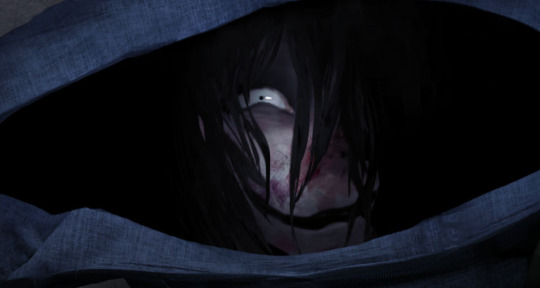
#homicipher theory#homicipher#mr gap#mr gap homicipher#homicipher spoilers#game theory#character theory#homicipher game#dark topics#content warning
83 notes
·
View notes
Text
Ok rq Phainon theory/character dive. Includes 3.4 leaks and 3.3 spoilers btw

There is something about his e4 that just. Absolutely breaks me. It’s his eyes. They look so broken. So lonely.
Because he is. All of his friends—all of his family—they’re dead and/or unreachable. He feels as though he cannot lead Amphoreus to Era Nova. As stated in this note after 3.3’s story:

He is afraid. He is hesitant. He doesn’t wish to be in this spot. He is afraid he is not the right person, that this role of “Deliverer” will be the death of all Amphoreus. No matter how hard he tries, no matter how brave he seems, deep down he is truly, truly so afraid. Nervous. Anxious. He truly believes that someone else is fit for the role. It should have been Aglaea, or Mydeimos.
It’s not something new. He knew that from the beginning, ever since he met Aglaea with gracefully accepting Mnestia’s divinity, and when it truly set in when he failed Nikador’s trial, when Mydei took up the title of the Demigod of Strife. When he left to fight the Black Tide alone.
After Mydei left, he went alone in his room and cried. Not only because Mydeimos left, but because it’s starting to set in. He has to lead Amphoreus to Era Nova. After the vote was cast to continue the Flame-Chase Journey, he again went in his room and cried afterwards. He has to bear the weight of the world on his shoulders, alone. Is this how the previous cycle’s incarnation of Kephale felt? Did they feel alone? With the weight of their shoulders, do they feel truly alone? Did they hesitate? Did they feel as though they couldn’t do it—that they aren’t enough?
Or did they lead Amphoreus to victory with their head held high—brought back the light, fought the black tide and swept away the night to hold it off until the Chrysos Heirs of the next Era could begin the cycle again? Did they lead with pride? Honor? Strength? Are they looking upon him right now—scoffing? Rolling their eyes? Clicking their tongue? Cursing his name? Did he end up how Kephale wanted them to?
Why would he? He’s not even confident in himself. Yet he puts on this mask of fake pride and confidence. Of nonchalance. Despite his friends all dying around him.
He knows that death is inevitable along the path of the Flame-Chase Journey, but he wasn’t expecting so many losses of those closer to him all in a row. Aglaea. Castorice. Hyacine. Mydeimos. Trinnon.
Yet that’s what keeps him going—he knows that their eyes are on him. He knows they are watching him with hope. Lead us to Era Nova, Deliverer. I know you can do it.
But what if he can’t? What if the weight of the world is too much, he can’t control it—or even take over it?
No, he has to. For the sake of those counting on him. He’s wracked with insecurity, yet he choses to move forward. Even after all the chaos that just happened. He has to become the dawn. He will become the dawn, for the sake of his people. For his hometown. For Cyrene’s sake.
It’s just like when Mydei departed for Castrum Kremnos, he’s putting on a nonchalant front to ease the pain. Save his dignity. He looks so confident and nonchalant, yet deep down he is so, so broken. He is torn. He wants to put an end to the endless cycle of suffering. Over and over—we don’t know how many times this has happened, but it’s happened enough—too much.
Perhaps when the seemingly endless cycle ends, he will meet everyone again in the next life. Cyrene when he’s young. Aglaea as perhaps a tailor in the big city. Cifera caught stealing in the city. Castorice by a river. Anaxagoras as his professor at school once more, Hycinthia again as his student teacher. Mydeimos at the Kremnos Library. Perhaps all he wanted to do in this life is live a normal life, be a country boy who yearns for the big city. Be a reckless teenager. Find someone. Grow old and die with them.
But he can’t get that until tomorrow. Until Era Nova arrives, he will not get that. So he has to lead them to victory, and hope the Chrysos Heirs of tomorrow will realize sooner that it’s all just a cycle so they can put an end to it and live their lives out. Because right now, there is no turning back. Not until Tomorrow arrives.
#amphoreus#amphoreus spoilers#phainon#phainon honkai star rail#hsr phainon#phainon hsr#the weight of the deliverer#hsr#honkai star rail#honkai sr#aglaea hsr#cyrene hsr#anaxa hsr#hyacine hsr#cipher hsr#mydei hsr#hsr theory#hsr characters#character theory#phaidei if you squint#uaghhh#sob. cry. lets do this.#sobs violently on the floor#i hate this#so much.#it’s so painful#hoyoverse why#why hoyo#heartwarming story my ass#</3
43 notes
·
View notes
Text
Eclipse Character Analysis (Sun and Moon Show)
Alternate Title: Why I'm 95% sure Eclipse is a sociopath EDITED TITLE: An Analysis of how Eclipse's ASPD is reflected in his character
A hopefully unnecessary disclaimer: - One, hi, hello I am a sociopath, I do know what I'm talking about. This also means that a lot of what I notice and will describe about Eclipse are similar or the same as my own experiences living life in this mortal realm. What I will touch on in the "redemption" section is heavily based on the kind of intensive treatment I had to get in order to improve my behavior when I was younger, so it's important to note that while Eclipse will never be able to change his personality (like how I can't change mine, and you can't change yours), he can change his thought patterns, mentality, and behavior. The saying that "sociopaths can't change" is specifically talking about how we can't change our personality, which is true for everyone. That doesn't mean we can't learn to function better in civilized society or be taught emotional awareness and morals. - Two, hi, hello this is just what I've noticed and does not mean it's canon unless Reed or Davis themselves come onto my Tumblr and go "Yes, this, this is what is correct", and even then, you're allowed to have your own opinions and views on these characters. I'm just theorizing here EDIT: Reed and Davis confirmed that Eclipse is indeed a sociopath a day after I posted this here, and a week after my initial post in their server that is basically this but slightly messier. - Three, hi, hello I'm also a psychology student so I also know what I'm talking about in that regard too. I've been studying psychology and general medicine for three and a half years now, so I like to think I have some idea of what I'm talking about - Four, I use the terms sociopath, ASPD, sociopathic disorder, and anti-social personality disorder interchangeably since they all describe the same personality disorder - Five, this analysis is long, I cover the basics, an in depth, some potential scenarios, a redemption arc possibility, and some other thoughts I have about him. - Six, I made this disclaimer to address any potential misunderstandings, or harmful stereotypes that I tend to be confronted with any time I talk about ASPD. Now onto the good stuff!
Too Long; Won't Read - Here's a Summary
Attachment and Pride: Eclipse initially cared about Lunar, and his reaction to Lunar leaving suggests a fragile pride. His inability to connect with others is evident in his strained relationships with KC and Bloodmoon.
Masking Emotions: Eclipse keeps his darker thoughts to himself at the beginning, and throughout the show as well. He masks both his emotions, and his intentions throughout the show, and is careful not to show when people have upset or offended him. This behavior stems from a learned experience that letting his guard down leads to resentment.
Manipulation and Brash Communication: Eclipse is straightforward and brash when expressing thoughts, feelings, or opinions. He employs manipulation when needed but is mostly disinterested in others.
Boredom and Stimulation: He seeks reactions from people, often causing chaos for entertainment. Boredom, especially when stuck as an AI, prompts him to instigate situations for amusement.
Lack of Empathy: He also appears to lack empathy, as evidenced by his inability to understand emotions and his focus on getting reactions rather than connecting with others.
Touch Aversion: Eclipse's lack of physical affection aligns with the common aversion to touch seen in individuals with ASPD.
Remorse and Growth: Eclipse shows remorse only in instances where he hurts Lunar in the beginning of the show, indicating a potential area for growth. A redemption arc could explore his struggles without completely erasing his apparent sociopathic nature.
Writer's note: A thoughtful portrayal of Eclipse's sociopathy, should my theory touch on the truth, if continued in a storyline, could provide an authentic exploration of mental health challenges and personal growth. Care should be taken to avoid stereotypes (DON'T USE GOOGLE FOR INFORMATION ABOUT THIS I BEG)
Putting Him Under a Microscope - Full Analysis
1. Attachment and Pride:
Eclipse's initial connection with Lunar suggests a potential attachment, a notable aspect in individuals with ASPD who can form (highly) selective bonds. However, Lunar's departure significantly impacts Eclipse's pride. This reaction aligns with the fragile self-esteem often observed in those with ASPD. The departure becomes a perceived personal betrayal, triggering Eclipse's defensive response.
In individuals with ASPD, relationships often serve specific purposes, and Eclipse's attachment to Lunar may have been driven by a combination of genuine connection but also very clearly the utility Lunar provided in fulfilling certain needs or desires. (Which was helping Eclipse get the star of course)
Moreover, Eclipse's struggle with connecting to others, evident in strained relationships with KC and Bloodmoon, is a characteristic of ASPD. Individuals with this disorder often face challenges in forming and maintaining meaningful relationships due to their limited capacity for empathy and understanding of emotional nuances.
2. Masking Emotions:
Eclipse's tendency to keep darker thoughts to himself reflects a common coping mechanism associated with ASPD. Individuals with this disorder often learn to conceal their true emotions early on due to negative experiences when expressing genuine feelings. This learned behavior serves as a protective measure against potential backlash or social rejection.
The fear of vulnerability and subsequent consequences aligns with the interpersonal difficulties faced by those with ASPD. Eclipse's decision to hide his less socially acceptable thoughts is a strategic choice aimed at avoiding conflict and maintaining control over his image.
Professionally, the concealment of darker thoughts is recognized as a defense mechanism in individuals with ASPD. This protective facade, or 'mask,' becomes an integral part of their social interactions, allowing them to navigate social situations with greater ease. However, this constant need to mask one's true feelings can contribute to internal struggles and further isolate individuals with ASPD from genuine emotional connections.
One may ask, what 'darker thoughts' did Eclipse show, or receive backlash for? Well, let's see, when he was stuck in Sun for the beginning of his life, he was first confused, a bit scared, and completely disoriented. He was forgotten, and during the first parts we can see him trying to reconnect with Moon, however, his delivery, as individuals with ASPD tend to do, was brash. It didn't sugar coat what he wanted, and considering his earlier transgressions previously, they weren't taken well in the slightest. Instead of Moon trying to genuinely talk and explain, all he provided Eclipse with was "I changed, and you didn't." and in general was very annoyed and irate with Eclipse. There were several times during the beginning of Eclipse, where there could have been progress made with him, to help him work through his issues, his internalized fear of being forgotten again, and the accidental neglect, that just… didn't happen. Because Sun and Moon saw him as a virus.
Moon because Moon saw himself as a virus, so what else would he think of something that originated in his code, and acted like he used to? Acted like he still sometimes did, parts of himself that he didn't like about himself, living and breathing once again in the mind of his brother. Corrupting him.
And of course, Sun because he was just so tired and hurt and he finally thought he could have something only for this ball of code to make itself known? This peice of his brother that was left behind, that was formed from Moon's killcode? That was constructed from Moon's literal need to lash out, hurt others, and kill. I'm honestly a little horrified that this is never touched on in the show, because people aren't just born to be awful, that's not how this works. There were so many opportunities where toxic and awful behavior could have been stopped if it was handled properly.
Of course, I'm not blaming Sun and Moon. It's hard to help someone who doesn't understand they need help, and as a result the person won't want help either. Plus, they've said it themselves in the episodes where Lunar had returned from the dead. They were never programmed to understand mental health issues, and they have a hard enough time grasping the concepts of their own mental health issues to deal with other peoples. Especially other people who are actively hurting them, it's hard to feel sympathy for someone who causes you harm as far as I'm aware. (I personally wouldn't know)
But back to my main point, there absolutely were times in the beginning where Eclipse was just honest about his wants and desires, and was shown disgust and hatred for it. Which would absolutely make him be prone to masking, which he does a lot in the show from what I can tell.
3. Manipulation and Brash Communication:
Eclipse's communication style, characterized by being brash and straightforward, aligns with the speech patterns and tendencies often associated with ASPD. When he's not trying to pull a fast one over someone, he's very blunt, and he doesn't beat around the bush. Individuals with this disorder may utilize manipulation as a means to achieve personal goals or navigate social situations, but without a reason to sugar coat, they won't. Although sometimes not sugar coating is also employed as a manipulation tactic, which makes it tricky navigating conversation at times with sociopaths. Eclipse's lack of hesitation in employing manipulation reflects the calculated nature of his interactions, as we see him smoothly switch between fronts, acts he puts on to get people to agree with him.
His disinterest in others, apart from exploiting them for personal gain, is consistent with the self-serving behaviors commonly observed in sociopaths. The use of manipulation as a tool for control and amusement is a manifestation of the disorder's impact on interpersonal dynamics. When he contacts Moon for help with Killcode, even then he has his own motives that are only helped by Moon being distracted with Killcode, as well as having KC out of the picture.
Professionally, manipulation is recognized as a prominent feature of ASPD. Individuals with this disorder may lack the ability to form genuine emotional connections and, instead, view relationships as transactional opportunities. Eclipse's interactions, particularly with Sun and Moon, exemplify this transactional approach, where he derives amusement from creating chaos. This last bit (amusment) is important, and I'll cover it next.
Before I pop on over, this is where I'd like to touch on Servant Eclipse. He is very crafty, and very manipulative, but it doesn't fool Lunar, who he clearly cares about to some degree. (Again, will say it as many times as needed, people with ASPD can care about people, it's just a lot of effort at first, doesn't come naturally, and is reserved for a select few). Lunar in this reality probably knows Eclipse inside and out, and isn't fooled by the not very convincing "I'm just a husk now" act Eclipse is playing out with. I suspect that Eclipse also is aware the Lunar isn't fooled, but it amuses him to some degree to keep up the game. I can only imagine serving a "Lord Lunar" is a fairly excitable life, and it's unlikely he's extensively bored. He's also just as brash as the OG Eclipse, and doesn't sugar coat the truth, or tries to ease Gregory into topics.
4. Boredom and Stimulation:
Eclipse's constant quest for stimulation and amusement, even at the expense of creating chaos, reflects a key characteristic of individuals with ASPD. Boredom intolerance is common in this population, leading to a perpetual need for excitement and novel experiences. (Can speak from experience, I spend about 4-6 hours every day bored out of my freaking mind and it's absolutely torture - which is why I draw so much)
The portrayal of Eclipse as being "bored out of his mind" when stuck as an AI in KC's base underscores the challenge individuals with ASPD face in mundane or monotonous situations. The need for stimulation is a driving force behind their impulsive and sometimes risky behaviors. There's a certain kind of restlessness, and impulsivity associated with ASPD, very much an act before you think, get defensive when confronted, and maybe think about it two days later on the very small chance it triggers a sense of morals/remorse. (Then probably forget it happened, cause we are very good at not caring enough to remember half the stuff we do. This isn't a choice, by the way, people with sociopathic disorder just aren't wired to feel strong emotions like guilt and shame.)
Professionally, this behavior aligns with the clinical understanding of ASPD. Individuals with the disorder often engage in sensation-seeking activities to counteract feelings of boredom and emotional emptiness. Eclipse's enjoyment in hacking Moon's computer, causing reactions from Moon and Lunar, serves as an outlet for his need for stimulation and disruption, as well as fulfills other purposes in starting a conversation with Moon about KC.
And of course, now I get to touch on my two favorite things that just drill this in. When OG Eclipse gets the star… what does he do? He torments Sun and Moon instead of wiping everything away, and I'm aware this is mostly because he doens't have mastery over the star. But what does Sun say, when Eclipse shows up to torment them on top of the play structure. Something along the lines of, You're just bored at this point? Is that it?
And what does Eclipse do? He leaves. Because Sun is absolutely right, and it probably stings his ego to have someone he so fully has convinced himself of hating to be right about him. Even before he gets the star… just how much effort did he really put into getting the star? Sure, he had this big plan, but I think he was aware that the 'perfect world' would never make him happy to start with; he just felt the need to be something larger than life, so of course you must set the largest goals to achieve in order to be that. He could have gotten the star so much faster lets be honest. I fully believe he was just having too much fun messing with Sun and Moon, because it gave a reaction, and the reactions to his actions were exciting, breaking his boredom. He was bored a lot, stuck in Sun's head, stuck in Sun's body and pretending to be Sun, stuck as an AI, stuck with Solar Flare's AI fighting him, stuck being unable to use the star…….. seeing a pattern yet?
And of course, my second favorite thing. Lord Eclipse. Moon full out calls him out on how bored Eclipse is, and Eclipse first tries to deny it, then sees no tactical advantage to denying it, and admits that yeah, he is bored. He's been bored for ages and Moon is the first exciting thing in what feels like forever. He's not happy in his perfect world, but he isn't going to change is because that would cut his pride for Sun and Moon to be right about what he wants and needs after so many years. So many years of his Moon being dead. Of having Sun as an obedient servant, bound to his beck and call. He's bored, and it shows, and he knows that it shows.
5. Lack of Empathy:
Eclipse's consistent inability to understand and empathize with the emotions of others aligns with a central feature of Antisocial Personality Disorder (ASPD). Individuals with ASPD often struggle with recognizing and comprehending the feelings of those around them.
His focus on getting reactions rather than forming genuine connections reflects the hallmark trait of lacking empathy. Eclipse's interactions with Sun, Moon, and Lunar highlight his detached and indifferent approach, as he manipulates situations purely for personal amusement without regard for the emotional impact on others.
Professionally, the deficit in empathy is a well-documented aspect of ASPD. Those with the disorder may comprehend others' situations on a cognitive level but struggle to grasp the emotional nuances involved. Eclipse's inability to understand why Lunar is upset and his constant pursuit of reactions underscore the emotional disconnect inherent in individuals with ASPD.
Eclipse's interactions with Lunar provide a poignant illustration of his consistent lack of empathy. Despite a seemingly genuine attachment to Lunar in the beginning, Eclipse's emotional disconnect becomes evident as Lunar leaves. The impact of Lunar's departure on Eclipse's pride and subsequent defensive reaction highlights the absence of genuine understanding of Lunar's emotions. Eclipse struggles to comprehend the significance of Lunar's departure beyond a perceived personal betrayal, showcasing a lack of empathy toward Lunar's perspective.
Moreover, Eclipse's manipulation and attempts to provoke reactions from Lunar, even after Lunar has left, underscore his disregard for the emotional toll on Lunar. This behavior aligns with the typical patterns seen in individuals with ASPD, where the pursuit of personal amusement takes precedence over the emotional well-being of others.
Eclipse's inability to process and acknowledge his own damaged ego resulting from Lunar's departure further emphasizes his lack of emothional understanding. He doesn't want to admit that Lunar hurt him, so instead he just continues to shut it down, bottle it up, and let it churn into hatred instead of looking at what he did wrong. His resentment and refusal to acknowledge the emotional impact on Lunar highlight the emotional blindness inherent in individuals with ASPD, especially in the context of complex interpersonal relationships.
6. Touch Aversion:
Eclipse's noticeable lack of physical affection, as both seen throughout the show, and mentioned when Lunar clings to Sun and states that Eclipse never showed him physical affection, aligns with a common trait among individuals with ASPD. Touch aversion is a characteristic feature, as those with the disorder often lack the intrinsic desire for physical closeness or intimacy.
Eclipse's minimal physical interaction, even in what could be perceived as emotionally charged moments, is consistent with the general pattern observed in individuals with ASPD. The absence of hugging or comforting gestures suggests a limited appreciation for the emotional needs of others.
Professionally, touch aversion is recognized as part of the interpersonal challenges associated with ASPD. Individuals with this disorder may not instinctively seek physical connection unless it serves a specific purpose, such as manipulation or personal gain. Eclipse's avoidance of physical affection adds a layer to his character, illustrating how his interpersonal behaviors align with the clinical understanding of ASPD.
This aspect of Eclipse's character contributes to a nuanced portrayal of the disorder, showcasing how the lack of tactile expression can impact the dynamics of his relationships, particularly in situations where emotional support is expected. (Like seriously, even Sun and Moon hug when one of them are having an awful day, but Eclipse? He literally doesn't seem to understand why Lunar craves positive physical touch so bad, because he just… doesn't feel the need himself. You can never fully understand something you experience, and it's not like people were explaining these basic needs and wants to Eclipse… ever.)
7. Remorse and Growth:
Eclipse's occasional display of remorse, particularly in instances where he has harmed Lunar, offers a glimpse into a facet of his character that deviates from the (BAD DOWNRIGHT AWFUL) stereotypical image associated with ASPD. While individuals with ASPD are often poorly and harmfully characterized/stereotyped by a complete lack of guilt or remorse, Eclipse's moments of internal conflict suggest a degree of emotional complexity.
Professionally, the intermittent remorse aligns with the recognition that individuals with ASPD may experience moments of internal conflict, especially in relationships that hold personal significance. Eclipse's struggle with whether to apologize after hitting Lunar reveals a brief internal debate, questioning the severity of his actions against Lunar's emotional response.
However, Eclipse's ultimate decision not to apologize, driven by his failure to perceive the significance of Lunar's distress, reinforces the inherent challenges in navigating emotional landscapes for those with ASPD. This internal conflict and eventual dismissal of remorse contribute to a more realistic portrayal of the disorder, highlighting the ongoing tension between impulsive actions and moments of potential introspection.
Should Eclipse undergo a redemption arc, these moments of internal conflict could serve as a foundation for growth, illustrating that while individuals with ASPD may grapple with moments of remorse, their ability to sustain lasting change remains a complex and challenging journey. Of course, I'm going to cover this as well.
Redemption and Recovery
Eclipse's potential redemption could be approached with an understanding that a complete overhaul of his personality is near impossible, because as psychology has shown, you don't just change your personality. However, nuanced growth and positive change within the framework of his behaviors and thought patterns can be explored.
Increased Self-Awareness: Eclipse could undergo a process of heightened self-awareness, acknowledging the impact of his actions on others. This could involve introspection into the motivations behind his behaviors and the consequences they entail. This won't be something he does on his own, he's going to need someone behind him, pushing him to be better. Preferably someone who has no majorly poor history with him for the best results.
Therapeutic Support: In a realistic redemption arc, Eclipse might engage in therapy tailored to individuals with ASPD. This could involve developing coping mechanisms, enhancing emotional intelligence, and learning healthier ways to navigate interpersonal relationships. Cognitive Behavioral Therapy (CBT) is a very affective type of therapy for people with personality disorders, or collections of disorders that combined provide the complications of a personality disorder.
Recognizing the Value of Relationships: Eclipse could gradually come to recognize the value of genuine connections beyond their utility. This may involve acknowledging the significance of relationships for emotional support and personal growth. This is going to be a process, and he will mess up. He will forget. It's something he will have to choose to work with in order for it to work, and even then he will make mistakes. It will be important to have patience with him, and instead of lashing out (cause that can cause a spiral back into poor behavior), working on these slip ups with him, and helping him relearn the significance of correcting it when he messes up.
Empathy Development: A full restoration of empathy is be unrealistic, Eclipse could work on developing cognitive empathy—understanding others' perspectives intellectually, even if not emotionally. This could improve his ability to navigate social situations more effectively. (This is what I do! <:happy_stim:867544047735275521>)
Establishing Boundaries: He should learn to set healthy boundaries in his relationships, understanding that manipulating and exploiting others for personal gain may provide short-term satisfaction but is detrimental in the long run.
Contributing Positively: As part of his redemption, he could find avenues to contribute positively to others' lives. This could involve utilizing his unique skills for constructive purposes, fostering a sense of accomplishment outside of manipulative endeavors.
Maintaining Accountability: Eclipse's growth would involve a commitment to being accountable for his actions. This includes acknowledging mistakes, making amends where possible, and actively working towards minimizing harm to others.
Embracing Personal Growth: Eclipse's redemption arc could focus on embracing personal growth within the constraints of his personality. It's about acknowledging that while he may not fundamentally change, he can adapt and evolve to lead a more balanced and fulfilling life.
Potential Future Scenario: Eclipse Apologizes
Brought to you by someone saying that Lunar would refuse Eclipse trying to apologize, but I respectfully disagree, and here's why.
I think that if Eclipse ever does apologize to Lunar, Lunar would have literally no choice but to accept, because we’ve seen early on that he does not apologize
To genuinely apologize and acknowledge his wrongdoing would be major character development that would take a lot of time and struggle to get to that point, based on my theories/analysis about him
So by the time he can actually, truthfully apologize, there would be evidence to prove his struggle with his own twisted nature, and probably how he failed at times during the journey, and had set backs and road bumps. The others would have most likely seen the effects and effort it takes to learn to change for him, and would most likely acknowledge that he’s being truthful.
If Lunar doesn’t accept at that point, if it ever got to that point, Lunar would be acting irrationally due to emotional complications, would probably just hurt Eclipse when he’s trying to be better for his brother, and would most likely set him back. There’s a very destructive pattern of thought when it comes to personality stuff (which is what I think Eclipse struggles with, a specific personality disorder I’m writing a comic thingy about), because you can’t change your personality. You can’t will yourself to be a certain way, and so it’s very easy to destroy progress people make on self improvement. So lunar refusing the apology would most likely not only hurt Eclipse’s pride (like it was hurt when Lunar left his side the first time) but would also further his belief of “why bother if they won’t accept the fact I’m trying for them” that he’d probably struggle with throughout a period of character growth.
Lunar’s smart, and pretty emotionally aware. He can be petty, but if Eclipse were to get to that point, I don’t think Lunar would refuse it because he would have already seen the struggle and effort Eclipse had put through just to get to that point
Logically, Solar would be the best person to help Eclipse, not Earth
This is partly copied/pasted from some conversations and does analyze Solar a bit as well
I really honestly doubt that Earth is going to be able to help him, if he comes back, and I’m suspecting that Solar would do a better job because he’s the only who can understand, properly, the absolute hell that was waking up inside of Sun’s mind with no idea what’s going on and how he got there. Earth can be sympathetic and show him pity, but that’s not going to help him very much at the end of the day. He doesn’t want sympathy, he doesn’t want pity because he has associated that with being weak and out of control. He needs some one who will understand him, and who will fully understand how one small thing changed so much due to the snow ball effect. Which Solar would understand. He’s “nice eclipse” after all, aka just an Eclipse without such bad formative trauma. So he never spiraled, but he’s just as blunt and analytical as Eclipse tends to be, and would be able to actually communicate with Eclipse about his issues since it’s a situation he could have easily been in had things gone slightly different
Solar is probably the only one who can understand, and I mean properly understand, Eclipse’s trauma and bottled up emotions. And I think that if they’re going to give Eclipse someone who will support him, they should do Solar. He’s got all boxes checked
The ability to fully understand Eclipse
No bad history with Eclipse that would really affect how Eclipse treats him (It’s not like Eclipse knows he built the satellite)
Similar base personality, his just wanted warped and twisted in the start, but if you strip away Eclipse’s issues, they’re practically the same person… for obvious reasons
The willingness to say what needs to be said, and not try to sugar coat. Earth would try to let Eclipse down easy about stuff, ease him into it, and he’s gonna see that as her being manipulative because that’s how he manipulates people. He needs someone who is just going to lay things out on the table
And of course, Solar most likely wouldn’t think Eclipse is too far gone to change. Because how do you think that of yourself? And they are the same person, just from different perspectives. It’s a similar dilemma I have to just writing off Eclipse, when I take him apart and see myself staring back at me. But I was able to improve, it just took work, and it took a situation dire enough to get me to realize that if I didn’t want to ruin the few things I cared about, I needed to get my crap together. And that’s probably what he’s gonna need to, something that threatens what he cares about to the point he realizes that this can’t go on. (And I’m suspecting that something will be control over his own life, just like it was for me.) We saw at the end of his life, that he was starting to self reflect and realize that he needs to change somehow, and this was because his control over his own life was being threatened I suspect.
Extra, Smaller Analysis on Solar and Eclipse
It is important to note that Solar doesn't have this issue (ASPD), and I believe it's because he didn't suffer the same beginning that Eclipse did. They resolved the Solar issue when he popped into existance very quickly from what we can tell, and so he wasn't left in the dark for months on end, left to stew in his own agony and emotions. Personality issues are caused by trauma, and specifically ASPD is directly tied to neglect during the most crucial formative stages in development. Sun and Moon had no idea Eclipse was there, and didn't mean to abandon him, because they didn't know he existed. But this complete, and utter abandoment, what is probably internalized as a personal betrayal because I can imagine Eclipse being destroyed by the idea that Moon left him behind on purpose. Which is just… not a good thought for my man to have, because that leads to feelings of worthlessness, and self-hatred for not being 'good enough' to keep/take care of/help. Which then just snowballs into other negative emotions, that gets him all worked up, and then he's fuming at the fact that they left him. That they decided he wasn't worth keeping around, and how dare they make that decision about him for him?!
You can see how it gets out of hand quickly, as he realizes the neglect he's suffering from, the abandonment he's facing, and the fact that he's now trapped. That Moon got to escape, but he can't and it's not fair. This is the perfect breeding ground for that funny little disorder called sociopathy, and boy, there's almost nothing at this point that can convince me that he doesn't have it because it's all just a little too perfect. And the worst part?
I really really doubt it was done on purpose, but holy heck it would be so cool if it was. Not just because of how beautifully crafted it is in his character, how it's so consistent and real, but also because if it was done on purpose, it would show that the writers took the time to do real research about a disorder that is so often done so poorly, and is commonly confused with a completely different issue (psychopathic disorder). Even knowing that it probably wasn't done on purpose, I'm still gonna just cling to him because I love him and I want him to get the happy ending he deserves. And I mean that genuinely, people who are suffering and lashing out because they're drowing in hate due to unfortunate circumstances that were really out of their control deserve to be given the tools to improve themselves and their lives, and it would be wonderful to see this sentiment reflected in the show.
Wrap-Up Ramble/Writer's Notes
This is, of course, my own personal observations, and it is definitely a lot to read. I had a lot of fun constructing this thread, because it is so rare to find a character that I feel I can properly connect to. I've struggled with a lot of the patterns Eclipse has shown in the show that I've called out, and I've had to go through the steps in the 'redemption arc' section myself. It's not an easy process, and as I mentioned, him realistically improving is going to be a process that is going to be draining on himself, and the people around him. He will have to wake up and choose to go against the walls he's thrown up around himself every single day if he's going to have a realistic redemption, and it's going to be exhausting. But I do genuinely believe that he can change, and improve, because I was able to change and improve as a person. It took time, years of intensive self examination and cognitive based therapy, and it required a strong support system. Which hopefully, if he comes back to the show, he can obtain, because otherwise he will continue to drown in his own bitter stew of resentment for others and himself. And that's no fun, that's just depressing.
A lot of people look at Eclipse and think the villain, but I just can't. His actions make him a bad person, but taking apart the psychology behind him, and seeing how glaringly similar a character is to you that is supposed to be the 'bad guy'… I want him to be able, if he comes back, to get the proper 'recovery arc' that he deserves, and I really hope that if they do try to save him from his own demons, they do it properly, instead of giving him a complete 180. Because you can't change your personality, and Davis and Reed seem to be aware of that with Moon. Even when old Moon tried to be better, he was still an awful person. And the 'new' Moon is still eerily similar to the old one, and as the time goes on, he just becomes more and more like the old one. Because it's the same AI, he just lost his memories. He didn't do a whole personality change because he got his memory card wiped, because he's the same person where it counts. He just has the benefit of not having all of the pain his past self was carrying. He's free of the hurt, and trauma, and self hatred old Moon carried, but he's still Moon.
So I'm really hoping that they continue to accurately display psychology in their characters if they bring Eclipse back, because it is such an immersive show due to the fact that it makes sense. These things make sense psychology wise, their behaviors, actions, patterns of thinking and speech. And I really am looking forward to seeing if they bring Eclipse back because he's such a beautifully constructed character.
You Made It
This is the end of my massive post. Congratulations if you made it this far. If you did, uh, the password is Dorito. Leave it in the comments/reblogs to let me know you made it, haha.
I'd love to see people's thoughts on this and on him, so feel free to leave your thoughts as well in comments/reblogs. I'll try to reply to every single one I see. Again, I love his character so much, it's so well crafted, and it was so fun to take this apart.
Edit: I have been asked about where to find the thread/join in on the convo, etc a few times: I have a thread in the SAMS server here if you want to join the conversation
#fnaf#fnaf au#sun and moon show#sunrise fnaf#moondrop#fnaf dca#daycare attendant au#earth and lunar show#eclipse sams#solar sams#lunar sams#character analysis#long post#sun and moon show theory#character theory
320 notes
·
View notes
Text
Perhaps it was seeing it on a premium large format screen, perhaps it was my mood that day, or perhaps it is because I'm always drawn to the stories of people trapped inside of their contradictions — but I was impressed with "The Ballad of Songbirds and Snakes" last year, especially with its cinematography and editing. I thought bits of the film, particularly the climax, had shots/rhythm evocative of the great Terrence Malick only to find the film's editor Mark Yoshikawa is a frequent collaborator of Malick.
Now I could talk at length about those comparisons, or the sense of gaze of the film (Tom Blyth's eyes are fascinating to track when he's in close-up/medium shot), or the relationship the wider series has with the medium of television. But I'd rather talk about the beginning of one scene near the beginning of the third-act as an example of effective pacing building dramatic tension and establishing character.

Start on this wide shot at a low-angle. "The Ballad of Songbirds and Snakes" uses low-angle shots frequently, which makes sense in a story about insecurity about power/class gaps. Low or high angles means we see something at an unnatural eye-line — which creates a visual power imbalance.
In the background we have a man just barely peaking over the horizon. This is Coriolanus Snow, our boy from the Capitol who comes from a noble family that lost everything in the war. In the first chunks of the film, we learn that Snow wants to restore his family's former glory. He wants to get that power back. The power gap that we see.
But this isn't the Capitol. This is District 12. This is place he was sent because of his failure. He cheated at the titular Hunger Games to win them for his tribute. So what could he be looking for out here to help him with his desire?

POV shot now. Cutting from that low-angle wide to seeing through Snow's eyes. While it isn't the subject of this post, the POV shot is the most direct expression of gaze. Think about cinema's greatest voyeurist Alfred Hitchcock and all his iconic POV shots ("Vertigo"). Nothing gets inside of a character's head like literally showing what they see.
Snow moves toward something — a something we now know was the (relative) perspective of the first shot.
Or, rather, not a something. But a someone:
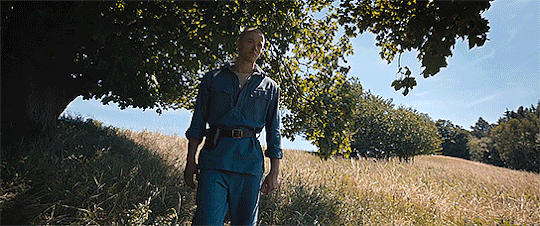
Now back on Snow. Only this time he isn't obscured in the background but near the center of the frame. The camera pushing in before to emulate his movement seen now in his movement. Going toward the someone seen in the previous shot. Someone we couldn't really see before — but now are getting closer to finding.

Close enough to see her guitar.
Of course, if we were listening we would already know that this is Lucy Gray Baird. For her voice echoes through the forest and calls to Snow. But we're sticking to the visual — where we see him pushing toward someone. Pushing toward her.
Baird was his tribute in the Hunger Games. Living (but not hailing from) District 12, she had the lowest odds to win the Games. But through her own determination and a little bit of a push from Snow, she succeeded in winning the Games.
More importantly — she succeeded in winning his heart, as he did to her.
Go back to earlier: the beginning of "The Ballad of Songbirds and Snakes" establishes Snow's desire as reclaiming his family's lost power. Story is conflict, conflict is character, and character is desire. Think mathematically for a moment: Character is action that is a function of desire. But desire cannot remain static. Pull any book or movie off of a shelf at a library. What a character wants at a start will not be the same thing/only thing they want at the end.
Snow began wanting to reclaim his family's lost power. But through this desire — him cheating the games and getting exiled to District 12, the lowest and poorest district in all the land, runs contrary to this desire. He cannot get more power being among the powerless. Why would he act in such a contradictory manner?
Because once he laid his eyes on Lucy Gray, young Coryo had a new desire in his heart. He didn't want to just reclaim what belonged to him, but he also wanted to protect her.
Like all functional drama, this creates a problem — he wants two things that are mutually exclusive. To protect her requires working against the Capitol which means pushing his family further down the social ladder. But to work on restoring his family means throwing her to the odds, and he can't stand thinking of her brown eyes dying out there.
Speaking of brown eyes...

Now we're on Lucy Gray's face. Focus on her and her playing (notice her eyes looking down and not hyperaware of her surroundings), but with another element in the background. Snow coming on the horizon.
Adapting a work from one medium to another always creates new restraints, but also new modes of expression. Condensing a 450-page novel into a ~2.5 hour film requires conveying the emotional arguments of the work in different ways. As such, "The Ballad of Songbirds and Snakes" focuses more on Snow's desires/contradictions than Baird's (even more than the novel) but we still have to some sense of her internal desire to create a compelling character that isn't just an object for Snow's character journey.
Of course, there is the real basic desire of surviving the Games, but that is lackluster and doesn't create real emotional bite. No, her central desire (at least in the film) comes through that one point mentioned earlier — she lived in District 12, but she did not come from District 12. Baird is a wanderer, or at least before the war was part of a wandering culture. Now she is trapped. Her desire is to get back what she lost; she wants to fly as a bird once again.
Look at the above shot. There is no distress on her face. While Snow got exiled for his actions in the prior chunk of the film, Baird got no punishment. She went back to District 12 and could play her music again. Not free to fly high but freer than she was at the start when she got called to fight in the Games.
This natural landscape Baird and Snow find themselves in during this scene is (metaphorical) paradise. It is the closest place to Baird's desire of freedom. The latter bits of the film's third-act use this idea to great dramatic effect.
Baird and Snow's desires both overlap and conflict. Both want to get something that they lost from the war — Snow his status, and Baird her freedom. But their desires operate in opposite direction. Baird wants to go up (free) while Snow is concerned with what's happening down on the ground among the social community. What Snow wants at the start can only be found in having people beneath him, while Baird's is found in having some space to be in.
But recall — Snow also wants to protect her, and this desire comes through a genuine feeling toward her. At the start it may be boyish attraction to her brown eyes and voice, but what his gaze perceived turned into something more. They both want the same thing of undoing loss.

And it's that sameness that pulls Coryo to Lucy Gray. That sameness that pulls him down the social ladder (he has a famous last name, she has no name) and down the society's hierarchy (he is Capitol, she is District) to risk his future for her. That sameness that pulls him to throw his own life and his chance of getting his past back away. That sameness that keeps him walking.

That sameness that makes her bring this strange man into her world. That sameness that makes her trust him with her everything.

Her personal space out here, far from the suffering in District 12 and the tyrannical bloodshed in the Capitol, now has the presence of that strange man she let inside.
Viewing this natural space as her paradise, she had won this peace but found that her ghost still lingers. A ghost that she doesn't really want to let go of — as evident by her attention going to him, and the unconscious act of her voice calling him here. Remember: nothing in conventional narrative is coincidence or happens spontaneously. Every action a character does is an expression of desire.
Why does she sing? Becuase that's her life. She is a performer. She performed on stage in District 12's bars. She performed when got selected for the Games, which is what first caught Coryo's eyes. She performed for the whole nation to survive in the games. And she performs for Coryo — because she wants to perform for him.
And through this her desire reveals its contradiction. She wants to be free and untethered; to fly like a bird. But she has the same feeling for him that he has for her, and this feeling creates an attachment — a tether. The wanderer found a home.

She could tell him to go away. She could tell him to leave. She could tell him to do whatever. Her words don't matter.
Film is a language of image. Sound (music and dialogue) matter, but ultimately is it a moving picture. A film establishes a character through visual actions. Lucy Gray identifies Coryo, and she stops playing so she can talk to him. So she can go to him. He is pulled into her world — but she is pulled toward him.
Think about the sequence of shots, specifically the POV shots. It is basic movement: start far from the object, and move toward the object. As the character whose POV the camera emulates gets closer to the object, the film cuts back to the opposite side to establish the geography of the scene. But it also creates a little bit of tension — these two forces are coming together and one of them doesn't know it, so what will be the reaction when they come together?
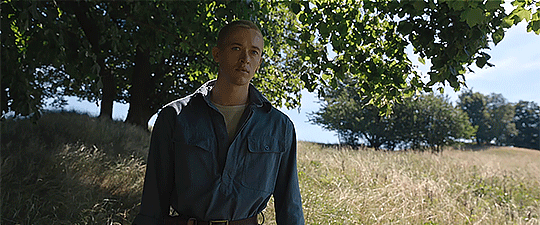
A few frames of static. Coryo stands in anticipation. Waiting to see what she will do.
Go back through these ten shots. Notice they all are of the same vantage point. We see Snow approaching from the horizon, and we see Baird playing her guitar on a rock with Snow coming behind her. While the scene progresses by composing more of the frame around the subject as they get closer together, the core angle remains the same: one shot from him walking and one shot of her point in space. We don't change this basic idea.

Until the scene begins with them coming together to have their first conversation since the Games — which also ends the scene as it shows the distance that remains between them.
They are pulled together, except Coryo stands above her. They both want to be together but they both occupy different places in the social hierarchy that they can never escape. The contradictions of their desires expressed in the blocking of one shot.
#the ballad of songbirds and snakes#snowbaird#tbosas#coriolanus snow#lucy gray baird#film theory#character theory#film analysis#tom blyth#rachel zegler#gifs#didn't revise this at all so i bet there are typos a plenty#it is late#too late
154 notes
·
View notes
Text
Bare with me, I never post anymore, but with the release of Caleb's trailer, I have the need to SCREAM.
I am so excited because let me tell you, I firmly believed the only way they could do it right was by bringing him back as THE villain. Not a villain, mind you, THE villain.
Now, hear me out, ok. As someone coming from both the original launch of both MLQC and LADS, I've been playing these otomes forever. Am I an expert? Absolutely not. Have I poured an obscene amount of time, energy, and even money into these games because they bring me joy? Hell yes. #noragrets
Mind you, this is just me speculating and having fun, take what resonates with you 😜
Let me ramble a bit more.
Slight spoiler ahead for mid MLQC lore, so maybe skip or come back to this later if you need to
I thought for sure that when Sylus was introduced, he was the be-all, end-all bad guy. But nope, what he got instead was a super delicious, badass mafia boss whose interests actually end up aligning with MC (because honestly, what he really wanted was YOU), therefore eliminating the truly antagonistic part of their relationship, even if it started that way. Don't get me wrong, Sylus is absolutely morally gray and suspicious, but for the most part, he's not malevolent.
Now, idk bout y'all but the entire VIBE of Caleb's trailer was dark. Stormclouds, abundant. Lighting, striking. Traumatic memories/dreams, all of the above. The best part, watching Caleb suit up into that delicious black uniform. Did that honestly look like a uniform the good guy wears? Because I say hell no, not with those eyes and smile that are suddenly less endearing and more unnerving! Also, let's take a quick peek at those handsome eyes for a second, hmm? What color are they, again?
VIOLET

In film and media history alone, purple is definitely a color associated with the more suspicious/villainous characters. And if we're going by Paper Games alone, you know who else has the dark hair/violet eyed wombo combo?
This shady bastard, right here:
My first love and the original, truly villainous LI of MLQC: Lucien, aka Ares.
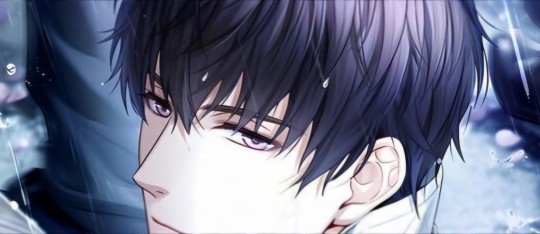
When I first started LADS, being a Lulu girlie, I immediately gravitated towards Zayne, obvi. But then I realized the only thing that was really similar was their stoic personalities. While they are also similar in terms of looks and professions, they share completely different motives. In reality, Zayne's arc mirrors more of Gavin's - reunited childhood friends. And while Zayne is typically an icy person in general, throughout the story he opens up so much to MC, allowing their relationship to grow. And while he is secretive about some things, for the most part, he's honest, almost to a fault. I never got the feeling or vibe that there was always another shoe to drop, or that he was hiding one hand behind his back while distracting us with the other like a certain someone listed above. And that is Lucien's draw. As soon as you find out his alter-ego, you're never TRULY sure which Lucien you're talking to from that point on. Are you Lucien, or are you Ares? Also, much of the time, especially in the traditional-themed cards, Lucien is almost always referenced with a snake to really hit home the duality and suspicious nature of his character.
I honestly think we're heading this direction with Caleb. Caleb, whose symbol is an apple. (Original Sin, hello.)
I feel like he's been in-the-thick-of-it longer than we realize. Like...he was recruited for a reason and it's not what we think. That wasn't a rookie's uniform, guys, that was a big boi uniform 😳 if you go to his character profile, it blatantly states he's a COLONEL. WHAT THE HELL!
Why am I excited about this? Aside from the copious amounts of angst we're going to get, it means that Caleb is already established in his career just like the others and that makes him more sure of his personal motives and decisions. (And his bad decisions, I can't wait for his bad decisions 🫠) This is what's going to drive the tension and antagonistic relationship between himself and MC. Because I can tell you right now, whatever that boy is doing, HE probably firmly believes it's the "right" thing to do. There was not one ounce of insecurity or hesitance when he put that uniform on. Is he tied to Ever? I'm going to say, absolutely. The speculation before the trailer was the only thing keeping me interested. I feel like they gave us a bland start to Caleb on purpose so the reveal would hit a little harder. And now that this seems to be the route we're headed, I'm INVESTED.
Food for thought, before I wrap up this long-winded rant:
Caleb is also supposed to be a direct foil to Zayne.
We already know that personality wise, they are quite opposite, but let's check their physicality.
Physically, they are very similar: tall, pale-skin, dark shaggy hair that's cut only slightly different. So where is our visual cue to really cement this foil? Well, it looks like again, it's all in the eyes. Because, what's across the color wheel from purple?
Green

This is just my take on things. Could be right, could also be dead wrong to which I will come back to this post and say so and leave it up for posterity's sake. 😆
At the end of the day, let's all remember that it's just a silly otome game that we all enjoy and in this house we love ALL 5 of our boys, (10 if we're adding MLQC 😂) so if you're gonna say something disrespectful or mean, please scroll on. But if you're coming with fun takes and theories of your own, I'm always free to chat!
#love and deepspace#lads#lads zayne#lads Caleb#Caleb's return#MLQC Lucien#mr love queens choice#mr love Lucien#otome#otome game comparison#character theory#lnds#l&ds
46 notes
·
View notes
Text
Salad Fingers
astro character theory

For whatever reason, I can't shake the thought that Salad Fingers has Pisces in his big 3 somewhere.
Extremely intelligent, yet exists mostly within his alternate versions of reality. Gentle, yet far from weak; in fact, he's endured too much. Endearing and off-putting at the same time. So many faces and personalities, yet somehow, always still him. The same.
This is just a theory, I don't have any proof but it's been on my mind for a few days. Since it won't pass, figured I'd share.
49 notes
·
View notes
Text
Pt. 3 of What Cologne/Perfume the Thunderbolts would Wear!! ദ്ദി(˵ •̀ ᴗ - ˵ ) ✧
Alexei Belova/The Red Guardian
Alexei would most def buy the flashiest and what he considers to be the coolest cologne. Especially after Yelena tells him that he smells like vodka and random stuff all the time. He probably used. At the bare minimum, soap and maybe beard oil. I think that he would he Bad Boy Cobalt (or any of this line tbh) and immediately SCREAM that he "found their logo."


As a gift from Yelena, he might wear Vodka on the Rocks By Kilian, a strong, fresh, and mossy scent. It is also something fancier that he received, and something he tells all his friends and the media about. He would totally make a crappy instagram or facebook post about how his daughter got him such a thoughtful gift.
(In reality, she didn't like what he used before and thought that if the cologne said 'vodka' he would wear it.)

#thunderbolts#yelena#yelena belova#marvel#marvel headcanons#headcanons#thunderbolts headcanons#alexei belova#the red guardian#red guardian#red guardian headcanon#cologne#perfume#character#character theory#character headcanons#hc#hcs
17 notes
·
View notes
Text

something I've always been wondering about, now I'm finally verbalizing it . . .


so we all know that his hero costome is just a shiny knight with a sparkly cape, more places to transfer his laser to and a red visor that protects him from his own shine.
but there's something interesting about the visor alone...
(season 7 spoilers ahead)

first of all, his visor is shaped like wings. but why does it look like wings in the first place?
is this to add some flair? is this just to stand out from other heroes? to be silly?
or is he trying to express his need for freedom in the most subtle way possible?

from behind, what does this visor look like when he's wearing it?
.
.
.
I've always laughed it off because "haha it's so long that it looks like devil horns from behind" but then I realised...
he might also be trying to express the fact that he's the UA traitor, another one of his cries for help way before the cheese thing.
anyone here thinking what I'm thinking?? I can't be alone, right??
right?? ☺️

#mha#bnha#yuga aoyama#aoyama yuuga#青山優雅#character analysis#character theory#fan theory#mha season 7 spoilers#can't stop twinkling#my hero academia#boku no hero academia#mha theory#mha analysis
13 notes
·
View notes
Text




“A single touch could Kill you!” ☠️ - Henry J Waterhouse lll
Oh how false and misinformed the monsters have been for over 6 centuries. Of course over time, information and documentation gets switched around by different outlets and opinions, but the monsters were never in any line danger. ☀️
Unfortunately for an early colony of monsters, in a time where medical advancements had not been discovered, sadly caught the wave of the Black illness in Europe from just a ‘regular’ scare, in 1350. Their record inadvertently kicked off the biggest fabrication in Monster History! 💀🚫
#monsters inc#monsters inc fanart#monsters university#monsters university art#monsters university fanart#monsters inc fanfic#monsters at work#monsters inc au#character au#art au#au#monsters inc cda#monsters university fanfiction#pixar monsters university#pixar monsters inc#fan theory#character theory#art theory#story art#storytelling#character fanart#digital fanart#alternate universe#2319#monsters inc oc#the black death#bubonic plague#character exploration#story development#story artist
25 notes
·
View notes
Text
Analyzing Neuvillette's Character Teaser From a Dissociative Disorder Perspective
I mentioned this headcanon a little in this post of mine, and described it heavily in this fanfic I wrote, but now I'm actually going to talk about it a little more in depth (´-ω-`)


I'm going to start by looking at a definition and a list of symptoms of dissociative disorders, because I think it's good to have some background on the topic, and I'll be referencing them throughout the post.


Now I'll look at the teaser!
This is one of the first scenes of the video:

In this line, Neuvillette says, "I neither know why I was born in this form, nor do I understand where this long life should take me."
Memory loss of this caliber (one's entire past) is known as dissociative amnesia. (unless it's caused by a brain injury... which I think it's pretty safe to say it's not, in this case.)
Also, I think it's true (for me, at least) that not having a clear vision of the past + present can cause one to have an inability to imagine the future.


Later we see Sedene say, "It's not like you to zone out!" to Neuvillette, despite how we see them "zone out" multiple times during their appearances in the game. I will also note that the "zoning out" was triggered by a memory, which makes it much closer to dissociation than just merely "zoning out".



The last part of the teaser I want to talk about is the end, where Neuvillette says the line pictured above.
They say very clearly that they can only understand themself through observing other people. This blatantly shows that they have a very blurred sense of identity, which is one of the defining traits of a dissociative disorder.

Then there's a few more points I want to make that's about their character in general, without the video.
The fact that Neuvillette is so closed-off towards others, and has such rigid boundaries, and doesn't understand human emotions— well, don't you think they must feel rather separated from themself and their emotions?
And they don't have many friends at all... they keep a harsh distance from everyone in Fontaine... doesn't that count as "problems in relationships"?
And if you've played/watched the Fontaine storyline, and/or read Neuvillette's character stories, well, you'd know they're definitely traumatized.
SO yeah, that's all, I just wanted to finally dump my silly little Neuvillette perspective on all of you (even though that's all I ever do anyway) ( ; ω ; )
Thank you for indulging me, haha!!! 💙
#neuvillette my beloved scrunkly fictive#neuvillette#genshin theory#character theory#genshin headcanons#headcanon#genshin#genshin impact#they/them neuvillette#dissociative disorder#🥜 peanupdate 🥜
21 notes
·
View notes
Text
Long af rant about Velvette's old design and character as I share my art of her :D
Pilot Velvette/ Og Velvette gives extreme babydoll harley quinn vibes, which is a stark contrast from how she ended up being in the show. I like to imagine that something extreme happened to her, like a horrible breakup or betrayal, and she went all crazy. This is the version of her we see in the pilot. The Voxtagram stories seemed to lean into this, depicting her as more immature, bratty, and murderous. She also depended more on Vox and Val like she saw them more as father figures than co-workers. (Just a thought.) However, as she adapted more to the landscape of hell she became the Velvette in the show; A fashion icon girlboss who is much more independent and while not serious, much more mature than her pilot counterpart, and even the other Vees. They ditched her psycho vibe to replace it with something that made more sense to her character.
Something that I personally wonder is: Why was Velvette like this in the beginning if she was meant to focus on fashion? A puffy Lolita dress goes against the Vees whole idea of being up to date, so what was the original vision for her? People have complained about Velvette already having too much going on for her, being both the overlord of fashion, master of social media, backbone of the vees, selling a love potion, etc. If those ideas were already there, did they just think a crazy serial killer girl would be even more extra clutter to her personality?
A concept many fans I've talked with is if the Vees personalities in the pilot stayed. Val would be pretty much the same, but the other two were almost different characters. In the Voxtagram stories, Vox let Val beat him around, had a goofy pet, and seemed to care less about his public image to remain more villainous. Velvette I already discussed was extremely different, the only thing connecting her to our Velvette is her connection with the Vees and fashion. In this universe, would Velvette see Vox and Val as toxic dads who kept breaking up and getting back together again, instead of seeing them as equals and KEEPING THEM TOGETHER? it's a wild shift.
Essentially, Pilot Velvette acted more like a bratty little girl, while her show version acts more like a annoyed but controlling teen. We see her pilot look as her profile picture, so this 'phase' of hers is still canon. I know she already died as an adult, which is why I'm so curious as to why she originally acted this way. Did Viv think she would be a better contrast to Vox and Val like this? To be fair, a spoiled brat AND annoyed girlboss are both contrasts of their personalities, just two different approaches. Was their originally going to be a backstory for her as to why she was this way? or was she just crazy to BE manipulative? or you know, just liked murder while looking cute like Niffty. speaking of Niffty…
I think Niffty is the most likely reason why they changed Velvette's design and personality. we already have a little crazy girl who admires 2 men she sees as older figures and enjoys murder for mysterious reasons. It mightv'e seemed a little counter-intuitive if there was 2 versions of the same character stereotype. Another reason they could've changed her is that she stands out more. If we're supposed to take Velvette as an overlord seriously, how are we supposed to do that when she leans back on the other two guys and looks like she's from a horror movie? Sure, I'm positive pilot Velvette could've been intimidating at times when she got legitimately frightening. however, this didn't seem like her vibe 95% of the time. It might've made her blend more into the background of the Vees than she practically already does. (Which is just a problem for female Vivzie characters but that's a whole separate rant.)
A headcanon of mine is that this was just her psycho little girl brat phase, and she is hella embarrassed over it. like a teen being embarrassed over their phases of when they were a kid. and Vox and Val would constantly piss her off by reminding her of it. That could lead to some fun banter in the future I would love to see as a reference to the pilot.
Anyways, sorry for the literal Essay I wrote here again, just a ton of over-analyzing which I'm best at. Personally, I do vibe with Velvette's new design and character for the show, I just cant help but think of why she used to be so different and arguably had the BIGGEST character shift from pilot to show In Hazbin Hotel.
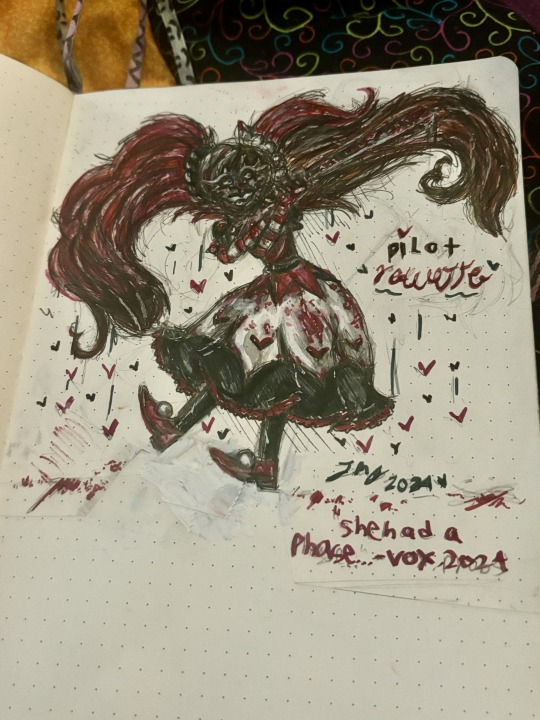

#hazbin hotel#hazbin hotel rant#hazbin hotel character analysis#velvette hazbin hotel fanart#hazbin hotel velvette#hazbin#rants n rambles#pilot velvette#character analysis#hazbin hotel vees#hazbin hotel thoughts#hazbin hotel pilot#ok but seriously why was she changed the most??#Deep deep deep dive lol#fanart#my art#art#hazbin fanart#hazbin hotel fanart#this is long I know#Character thoughts#character theory#hazbin hotel characters#hazbin hotel theory#Heyyy sorry I’m not super active but I will rant for way too long when I want
39 notes
·
View notes